#and queer relationships in gundam are not the same as in other anime
Explore tagged Tumblr posts
Text
would it be a hot take to say that "im so mad sulemio is gonna be queerb8" is goofy since theyre literally engaged and are shown nearly making out in every ed and op
#like is it just me or is it way too late to be queerbait#ALSO queerbait in japan is just not the same as in the US#and queer relationships in gundam are not the same as in other anime#the vague 'wait is this gay' in OG gundam was an actual relevant theme#and that was in 1979#g witch#gwitch spoilers#the witch from mercury#.text
37 notes
·
View notes
Text
Is Mobile Suit Gundam: The Witch from Mercury the first anime series to depict a married same-sex couple?

Given the rings and comments from the staff (excluding Bandai) it's pretty clear that both Suletta and Miorine are married. And looking at older anime couples I can't find another one where the characters are actually married to one another.
There are series that depict engagements and proposals (implied or otherwise with queer characters).
Some examples would be:
Yuri & Viktor from Yuri on Ice, where it's implied that they want to be engaged.

Ranma & Akane from Ranma 1/2, both find themselves in an arranged engagement but end up falling for each other anyway. Ranma is canonically genderfluid in both the anime and manga and Akane is attracted to Ranma as both a man and a woman. And this is ignoring all of Ranma's other fiances who know about their curse and want to be in a relationship with them anyway.

Utena & Anthy from Revolutionary Girl Utena, while the circumstances of their engagement are out of their control, the two of them fall deeply in love with one another despite that. And in the movie they kiss.

Other LGBT anime couples are together or in love but next explicitly depicted as engaged or married would be:
Michiru Tenou & Haruka Kaiou from Sailor Moon, they are very much together and in the Crystal series end up living together and adopting a baby.
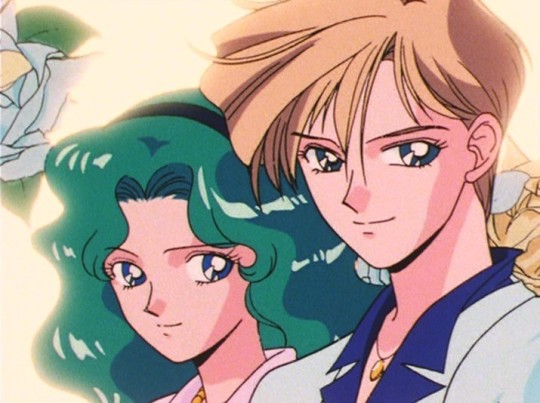
Yukito Tsukishiro & Touya Kinomoto from Cardcaptor Sakura, who are in love with one another.
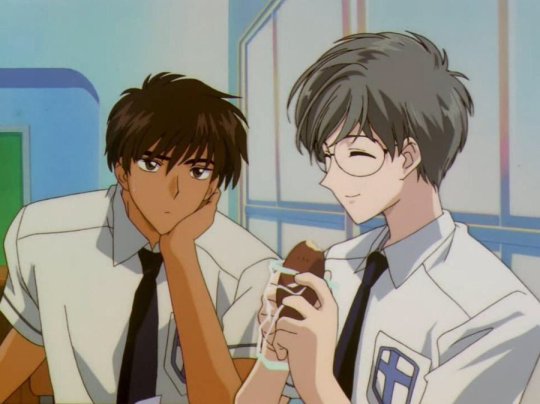
Eiji Okumura & Ash Lynx from Banana Fish, who are in love with one another. And it hurts.

Yuu Koito & Touko Nanami from Bloom Into You, who are two girls who fall in love with one another. And in the story you watch them grow and get closer.
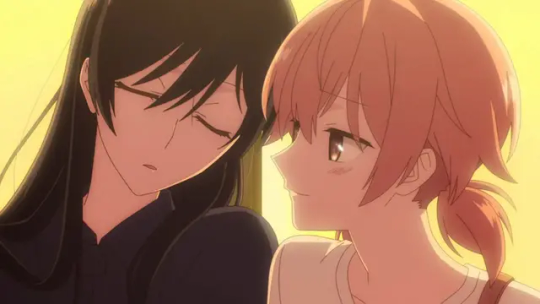
Nezumi & Shion from No. 6, a sci-fi drama where two boys fall in love. This one also hurts.

And countless other examples, none of which I could find have the characters taking their relationship further than dating or engagement.
So, is Mobile Suit Gundam: The Witch from Mercury the first married same-sex couple in anime?
On a minor note, there have been several gay weddings depicted in manga.
Some examples would be:
Our Dreams At Dusk by Yuhki Kamatani, which was written by an asexual, X-gender author.
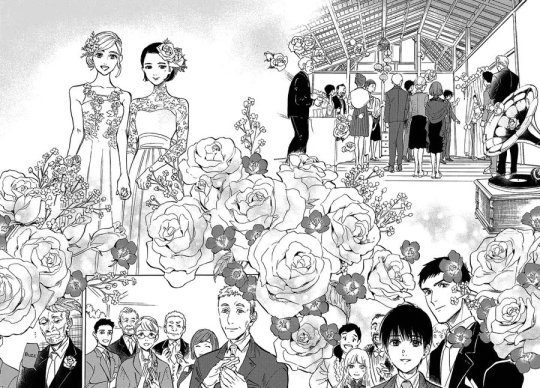
Until I Meet My Husband by Ryousuke Nanasaki and illustrated by Yoshi Tsukizuki. This manga was written by a gay man and based on his own essays about his life. The manga is auto-biographical.
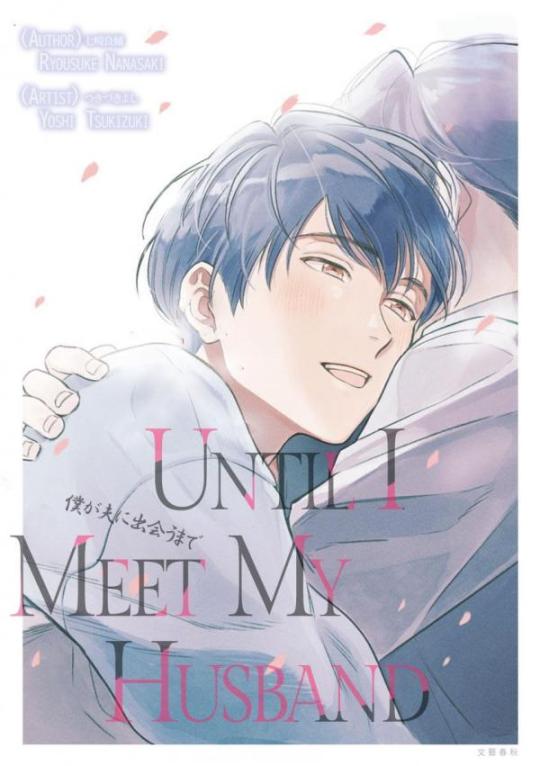
I Married My Best Friend To Shut My Parents Up by Kodama Naoko, who has written several other LGBT manga, most of which are Yuri.
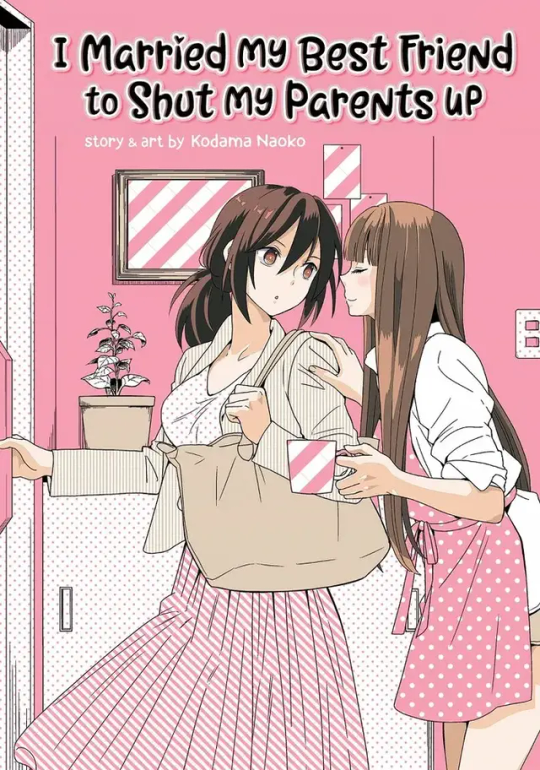
And there are several more!
Bonus:
Shoutout to Episode 7 of the 80s anime Dirty Pair for having a wedding between a cis man and a trans woman in one episode.

#gay marriage#anime#manga#lgbtqia#mobile suit gundam the witch from mercury#ranma 1/2#revolutionary girl utena#yuri on ice#rambles#sailor moon#card captor sakura#bloom into you#no 6#i married my best friend to shut my parents up#until i met my husband#our dreams at dusk#banana fish#dirty pair
868 notes
·
View notes
Text
IBO reference notes on . . . queerness
How has it taken me this long to write about this aspect of the show? (He asked rhetorically, staring at the enormous amount of fanfic that basically stands as a thesis statement on how very queer this part of the Gundam franchise is [as opposed to all the other terribly straight parts, he added, sarcastically].)
Anyway, let's do it. Full spoilers up to the end of the show will follow, together with discussion of child abuse and exploitation, since that is what IBO is all about.
Special thanks to @lilenui and @prezaki for their invaluable assistance in locating sources.
Statement of caveats: this work is an amateur analysis of the English-language localisations (subtitled and dubbed) of a piece of Japanese media. I do not speak or read Japanese. I am myself bi, which qualifies me to be attracted to more of the cast than the average viewer, and have a working knowledge of LGBTQ+ history in the UK and USA, which tells me nothing about the cultural and historical context in which this anime was made. As such, I will not be addressing the behind-the-scenes production or the corporate mandates surrounding it but will focus narrowly on what I perceive to be present in the text (hereafter meaning both the script and animation, and any additional fictional details provided elsewhere).
Queerness in Gundam
Some background before we dive in. To my knowledge, the first character in the Gundam franchise to be intentionally depicted as LGBTQ+ is Guin Sard Lineford from Turn A Gundam (1999). An ambitious young aristocrat who spends the series on the line between hero and villain, he is infatuated with protagonist Loran Cehack and the show makes little attempt to play this as anything other than one man falling in love with another.
This is entirely one-sided and not appreciated on Loran's part, although that seems to have less to do with it being homosexual attraction than with Guin's high-handed and entitled attitude to life, filtered through heavily gendered social norms. For plot reasons, Loran spends several episodes cross-dressing as 'Laura Rolla', corsets and all, and Guin continues referring to him as 'Laura' long after the deception is no longer required, saying it 'suits him better'. Guin is eventually called out on this by a third character, who accuses him of forcing an idea of feminity on the other man rather than stoop to place himself in the position of a 'wife'. Objectifying Loran is presented as of a piece with Guin's overall flaws as a person, to whit, putting his own views about how things should be above the material reality and desires of those around him.
Guin is also the only explicitly gay character in the show (I'm honestly not sure how to classify whatever Dianna Soreil and Kihel Heim have going on, but it's certainly not labelled in the text). Therefore no counterpoint is provided to demonstrate healthy queer relationships. I don't state this to dismiss his inclusion: he forms part of a smart, nuanced plot thread, and Gundam creator Yoshiyuki Tomino had to fight to get Guin's homosexuality clearly included. But even so, Guin is a palpable step forward rather than a watershed moment, and the end result veers close to some nasty stereotypes about queer people imposing their desires on others.
There are other examples of characters transgressing gender norms in Turn A, most especially Loran's aforementioned cross-dressing. He is comfortable playing the part of 'Laura', in ways that mitigate viewing this situation as the extended joke it might be in another production. Funny moments do come up – particularly in the lead-in to his 'debut' as he acclimatises to the female attire of the show's pseudo-Edwardian setting and takes posture lesson – but he and the concept of a man in ladies' clothes are never made a subject of mockery. The same cannot be said for the character of Sochie Heim, whose attempts as a young woman to fulfil a gung-ho masculine role often turn comedic. This is part and parcel of her assaying militaristic modes of action, which are soundly mocked across the board. It nevertheless stands out next to Loran/Laura.
Further, Loran's status as a literal moon-child carries implications for his attitudes. His dismissal of existing social standards on Earth is very much presented as correct, and in keeping with what I know of Tomino's other writing and stated beliefs, but it dovetails unfortunately with a treatment of queerness as otherworldly, not something that may be found among an average population. We get another example of cross-dressing in the next-but-one series, Gundam 00 (2007, not a work Tomino helmed), where the usually male-presenting artificial lifeform Tieria Erde switches to a female presentation (in a ball-gown, no less) during a covert mission. This sufficiently parallels Loran's case, I assume it was a deliberate call-back, being as it is a disguise enacted by someone even less typical than a boy from the moon.
What I am driving at is that while Guin, Loran and Tieria may be characters who are queer or perform queerness in some manner, they do not necessarily represent an outright embracing of queerness as a mundane facet of everyday life.
Fast-forward to 2024 and the latest mainline Gundam show is a lesbian romance.
If you have been following my blog for a while, you will know I do not hold The Witch From Mercury in especially high regard. I think it is annoyingly messy, frequently half-baked, and, broadly-speaking, exactly as frustrating as I'd expect from the guy who wrote Code:Geass. It's still an explicit love story that opens with a clangingly blunt statement about the acceptance same-sex relationships and ends with the two female leads happily married to one other. For all its flaws, I genuinely think the central relationship between Suletta Mercury and Miorine Rembran is a nice piece of story-telling, not to mention admirably open about what it is doing. Like it or lump it, Gundam is gay now, properly, with a protagonist and co-protagonist who can be definitively labelled queer and whose romance appears entirely unremarkable for the setting (in terms of being same-sex; clearly there is a lot to remark upon otherwise).
I would be remiss if I did not mention that the conclusion of the series was accompanied by a certain amount of corporate arse-showing, with hollow attempts to walk back the ending seemingly for the sake of appeasing homophobic elements within and without the companies that produce Gundam. The frankly laughable nature of these actions stands testament to how unequivocal G-Witch is. It is flatly impossible in my opinion to interpret as anything other than flagrantly homosexual, and that's great.
Between this interesting but limited start and the full-throated present lies Iron-Blooded Orphans (2015), my absolute favourite and the show that got me writing slash fic after years of… not doing that. So: what is the deal with queerness in IBO?
Natural for a human
By my count, including all present spin-offs, there are three characters stated in-text as being attracted to people of the same gender (Yamagi Gilmerton, Iznario Fareed, Deira Nadira), two who are at the least open to the idea (Norba Shino, Mina Zalmfort), two whose mutual attraction is stated within the context of polyamory with a third person of the opposite gender (Atra Mixta, Kudelia Aina Bernstein), one whose sexuality is briefly hinted at (Chad Chaden), and one male character who is possibly not attracted to women (Orga Itsuka).
Let's get Iznario out of the way first, because the less time we spend on the actual paedophile, the better.
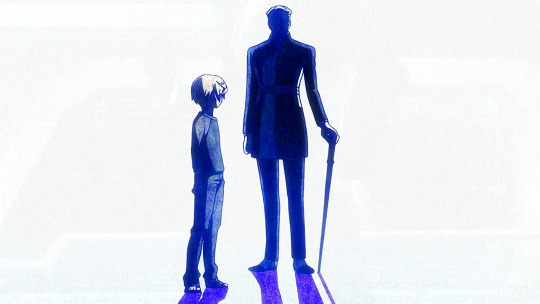
Lord Iznario Fareed is a rich, powerful aristocrat who sexually abuses young blonde boys and inadvertently sets large parts of the plot in motion as part of quasi-villain McGillis' backstory. In a lesser show, Iznario would be the embodiment of the 'predatory queer' stereotype Guin skirts the edge of. Here, however, he is very much not the only 'gay' character present and his proclivities demonstrate one of the many ways the world exploits vulnerable children, a core theme of the series. Early on, we see fleeting glimpses of young girls being pimped out on the streets of Mars. Iznario shows this social failing extends to the much richer Earth and although he is portrayed as the worst among the Gjallarhorn elite, they all abuse their power for personal gain. Thus, as much as the reveal of what he has done carries a certain shock value, it is not present purely for cheap impact. (This isn't the essay to discuss it, but the flashbacks to McGillis being abused as a child are a masterclass in how to frame such things around the victim, clearly communicating what's happening while avoiding gross voyeurism.)
I don't know how deliberate it is the canonical gay character who is shown in an entirely positive light fits the profile of Iznario's victims to a T, but it does underscore we're looking at a case of power allowing people to get away with hideous things, not a stand-in for queerness in general. To an extent I resent having to spell this out, since it seems so obvious Iznario is not fulfilling the role of a homophobic cliché. Sadly, the cliché exists and the point is worth discussion.
Moving swiftly on: Yamagi and Shino.
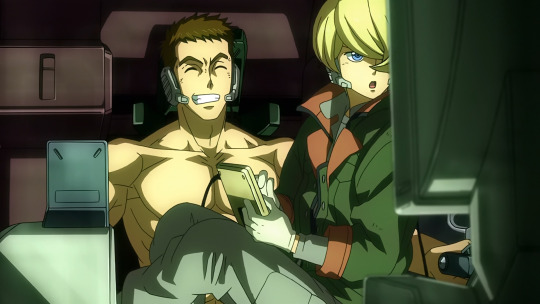
Yamagi Gilmerton is a small, quiet teenage boy with a somewhat withdrawn and acerbic personality, who spends much of Iron-Blooded Orphans nursing a hopeless crush on mobile suit pilot Norba Shino. Like the majority of the cast, Yamagi is a child soldier, but a mechanic rather than a combatant. Additional backstory commentary reveals that he struggled on joining CGS mercenary group due to his physique. Indeed, while this detail is not directly referenced in the anime itself, he is indeed drawn noticeably thinner than the other boys.
Again, we veer towards stereotypes, where a queer character is portrayed as weaker and more effeminate. Yet in spite of leaning this way in looks, Yamagi is an eminently capable person, never treated as lesser for fulfilling a support role rather than being a fighter. If anything, IBO goes out of its way to highlight how vital good mechanics are to mechanised warfare, and we see multiple examples of Yamagi being both assertive and kind of badass. At one point, he scales, unaided, an 18 metre tall mobile suit that's collapsed to its knees. When he and Shino are revisited in spin-off game Urdr Hunt (soon to be some form of animated production), he pilots a spaceship within an active battle-zone, flying escort for a damaged freighter as it retreats. In Season 2, he's comfortable ordering Tekkadan's new recruits around and is the first person to properly chew Orga out for his failings as a leader. Far from being an outlier among the protagonists, Yamagi is equally brave and dedicated to the cause, irrespective of his sexuality.
To be fair, he does tend to clam up and grow more awkward around the object of his affections. To be equally fair, he has the misfortune of having fallen for the most oblivious himbo on God's red Mars.
Shino is a big, boisterous warrior, the polar opposite of Yamagi in personality and physicality. He embodies Tekkadan's machismo, eagerly anticipating the chance to prove their strength and generally being a standard bearer for becoming the biggest, baddest group around. Things are not as straightforward as they seem on the surface, however. He shows a good awareness of when the group is in over their heads – going so far as to suggest retreat in the face of bad odds several times – and he is not nearly as sure of himself as he might first appear. He displays a wide streak of insecurity about his abilities as a soldier, reacting badly to people questioning his dedication or competency. And he crumbles completely when some of his comrades are killed as the result of a split-second mistake on his part, stating a wish to have died in their place. Thereafter, he acts in ways that read as choosing to take all the risks on himself rather than go through more loss. It makes him an interesting mix, someone who acts as a cheerleader, boosting everyone else's morale, while swallowing his own doubts and personal fatalism.
He is also presented as one of the most sexually active members of Tekkadan, using his wages to visit brothels to sleep with women. Indeed, he is frequently found extolling the virtues of the opposite sex, referencing collections of pornography (at least in the English dub), and generally being a very typical teenage boy about such matters.
Given this, you might assume Yamagi is longing hopelessly for a straight man. That is indeed the idea the show teases us with for much of its run (can something be straight-baiting? I feel if anything ever earned that title, it's this). OK, Shino's fond of Yamagi as a friend and frequently relies on his assistance in improving his fighting ability, and per ancillary material, is the one who got Yamagi transferred to the mechanics corps in the first place, rescuing him from struggling in the infantry. And sure, Shino spends an awful lot of time in very close proximity to Yamagi, including literally pulling him into the cockpit to assist with a mission. And yes, Shino is absolutely a flamboyant creature, sporting gold ear studs and an attraction to the colour pink, ensuring his mobile suits are painted all over magenta in order to stand out on the battlefield. And certainly, Shino is extremely empathetic, adjusting his attitude depending on his impressions of other people, such that he dials his boisterousness down in Yamagi's presence, displaying a far more gentle affection than he does with his other friends.
But clearly he hasn't noticed Yamagi is head over heels for him.
Right?
Well, towards the end of Season 2, during another moment where Yamagi is literally sitting on Shino's knee, Shino proposes the two of them drink together all night long once the fighting is over. Not only is this an unambiguously romantic overture (he's asking while pushing aside the fringe that normally covers half of Yamagi's face, in order to look into his eyes properly), it comes after a joke several episodes earlier in which Shino has to explain to a less worldly comrade that a girl inviting you for a drink is not a request to go out with the whole gang but a far more intimate gesture (I say explain, it's more expressing incredulity Akihiro didn't realise Lafter was asking him on a date). Later, it is revealed Shino did indeed work out that Yamagi 'likes' him (to his friend Eugene's exasperation that it took him so long to notice), and he reacted with amazed delight to discover there was someone in Tekkadan who'd fall in love with 'a guy like me'.

He'd assumed because Tekkadan is a family (a description provided by their ally Naze, which everyone just kind of runs with), romantic love wasn't possible between them. Having worked through this mental block and finally realised the blindingly obvious, he renews his desire to protect Tekkadan as long as he lives, refuting his previous view of himself as an expendable human shield and heading out with every intention of surviving all the way to the end.
And because IBO is an exquisitely-written tragedy, he is promptly killed while attempting a futile one-man attack against their enemies, his advances on Yamagi forming part of a long build-up whereby the boy who loves him provides the tools he needs to charge into a suicide run.
Right then. *drags out the reading comprehension soap-box* I have seen some people refer to this as an example of the 'bury your gays' trope, and there is nothing more likely to get me manifesting behind you in the form of an irate shoebill than to do likewise. 'Bury your gays' refers to a tendency for queer characters in fiction to disproportionately suffer tragic fates. This is a writing choice usually rooted in the idea queer relationships are inherently tragic, either because they are viewed as a perversion of 'correct' forms of love, or because of some misguided idea the prevalence of homophobia means queer joy is impossible. I am going to be charitable and concede this is indeed a case where one half of a budding homosexual relationship dies horribly. But, as always, the context matters.
All but one of the romantic relationships established prior to the epilogue of Iron-Blooded Orphans end in death. Of the two that survive in some capacity, one is a heterosexual background romance between two older characters and the other is a pair of women I shall be covering later. IBO is a story about child soldiers that does not shy away from the fact these are teenagers being fed into a meat-grinder. That the director's original intention of killing every named character was toned down (to the series immeasurable benefit, in my opinion) dos not change a narrative arc towards doom.
Within this, Yamagi and Shino aren't singled out for being queer. The coyness around Shino's eventually-evident bisexuality serves to generate an instant of hope and relief right before the rug is pulled from under everyone's feet. Where Shino's death does differ from those of other characters is in presentation: he dies alone and does not get any form of farewell or the passing-on moment afforded to others. But that is only to be expected, since we're talking about the point where it becomes clear there is no saving the situation. It's a cruel, abrupt moment of bad luck, puncturing the heroic idea of scraping victory at the last second. Shino flew out intending to live and he died anyway. A queer relationship forming part of what he was fighting for is an almost incidental detail.
(As an aside, I am aware of two other examples in Gundam fiction where a pilot and a mechanic have a doomed love affair. One is in Char's Counterattack, where a male engineer's romance with a female pilot ends with them both being abruptly killed, and the other is from Gundam AGE, where a female mechanic sacrifices herself for the greater good, leaving a male pilot to mourn her loss for the rest of the series. Shino and Yamagi reiterate this same concept.)
Stepping back from the tragedy, Yamagi's love for Shino is as delightfully underplayed as the other relationships in the show, with little emotional melodrama being wrung from the romance itself. Yamagi can't bring himself to declare his feelings, frequently turning cold instead and perpetuating Shino's misunderstanding of where they stand. Yet Shino ultimately proves enthusiastic for the idea, rendering moot any concerns Yamagi had over getting turned down (going beyond the text, a Q&A with the series' director confirmed Shino was written as bi). Equally, in the aftermath of Shino's death, Eugene comforts Yamagi by relating the truth of Shino's earlier realisation and even going so far as to rebuff Yamagi for implying there's something wrong with him for grieving. This and other interactions in the same episode imply those nearest to the pair were well aware of Yamagi's desires and had absolutely no problem with them. The prevailing attitude within Tekkadan is one of complete acceptance for its members and this is no different.
Indeed, for me, the most important part of how queerness is represented in IBO is that it is treated as just another aspect of the diversity of the cast. I've seen it stated that viewing homosexuality as a natural part of human existence was Tomino's motivation in making Guin gay. IBO presents us with the same idea, far more seamlessly and far more positively.
Now, let's leave the anime proper and look at the same-sex pairing from spin-off manga Iron-Blooded Orphans: Moon Steel.

Deira Nadira and Mina Zalmfort are part of the Gjallarhorn nobility and their marriage was arranged to strengthen relations between their two families. We see an example of a similar political match in the main show, where the heir to the Fareed family, McGillis, is betrothed to the second child of the Bauduins, the much, much younger Almiria. That this can take place regardless of the gender of the participants has big implications for the functioning of a bloodline-focused aristocracy. Presumably it indicates they are happy to use medical technology to ensure the Nadira family continues into the next generation, and if same-sex marriages are thus permitted, that means fewer factors to worry about when it comes to perpetuation. Whether male-male weddings are allowed too remains an open question; given the existence of real-world double-standards, it is possible Deira and Mina represent the only acceptable form of homosexuality. Nevertheless, that it is accepted speaks volumes. Gjallarhorn is not an especially progressive organisation, built as it is on rigid class structures and notions of human purity. Yet here we are.
Perhaps we should have expected that the norms around gender in this system don't correspond to strictly patriarchal patterns from the real world. Carta Issue, a key player in Season 1 of the anime, is the only child of the Issue Family's current leader and positioned as his sole heir, irrespective of the fact she's a woman. The logical inference is that any children of hers would count as Issues, rather than belonging to a potential husband's family. Deira is similarly the heir to her father's position, although intriguingly, it's not outright confirmed if she is his only child or simply the oldest. The possibility exists that gender is a non-factor in determining inheritance.
With respect to sexuality, Deira seems pretty obviously intended to be a lesbian. Her relationship with Mina is presented as one they are both happy with, despite it being an arranged by their parents, and Deira is depicted in the manual for Gundam Gremory's model kit as favouring the clothes of 'a handsome man'. She doesn't present that way within the manga' story, first showing up wearing the standard unisex Gjallarhorn pilot-suit, then wearing a formal gown for a meeting while in an official capacity. But she is depicted wearing masculine clothes in silhouette when initially mentioned and in a post-story panel at the back of the final volume.
(Another aside: the fan translations I use for this part of the manga refer to Deira using male pronouns when she's introduced. However, that could simply be down to the poor quality of said translation; she's consistently referred to using female pronouns in official materials and the game adaptation of this scene has her named as simply 'Lord Nadira', the standard appellation for Gjallarhorn family heads.)
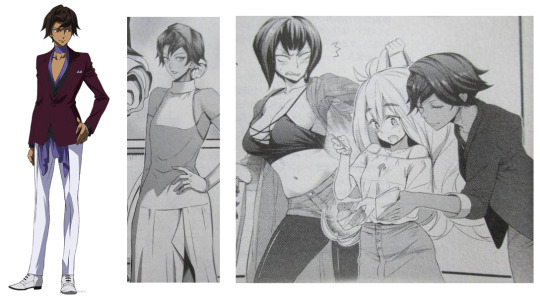
Whether Deira's code-switching is the result of institutional expectations around her role or personal preference, it adds extra texture to her depiction. While civilian garb was designed for the adult version of Carta and closely matches conservative gender expectations for a woman, she's never shown wearing it, so we don't have a point of comparison to judge what's required of a character in Deira's position.
Regarding Mina, you'll notice I grouped her with Shino rather than the characters whose sexuality I consider to be stated outright. With Shino, the nature of his sexuality is not put absolutely beyond question in the text. This is splitting hairs due to the overt nature of what's on screen but the fact remains, the anime doesn't clarify if his being open to Yamagi's love means he already thinks of himself as bisexual, or if this is something he hadn't considered before. With Mina, it's more a case that I'm unwilling to label her one way or the other based on the available information. Deira carries sufficient signifiers, I find little room for doubt over the intention. We also have an outright statement that she holds great affection for Mina regardless of being obliged to consider her an eventual romantic partner. Indeed, she becomes so upset by believing her fiance dead, she runs off to Antarctica in a Gundam. But the exact depth of Mina's feelings in return is not discussed.
In addition, Mina is considerably younger than Deira. McGillis and Almiria's match takes place when he is (probably) somewhere in his late twenties and she is nine, with plans for the union made four years prior. This is not great, to put it mildly, albeit fairly typical of how such things have historically worked for nobility. Based on appearances and how they are treated by the rest of the cast, I would assume Mina to be in her mid-teens, and Deira to be in her early twenties (annoyingly, exact ages are provided for several characters in Moon Steel, just not these two). A less dramatic gap (and I don't believe Mina is meant to be quite as young as her appearance perhaps suggests), yet still significant when one of the people involved is below what we'd consider adulthood.
There is no indication of anything untoward going on, within the confines of the situation, similar to how we're given no indication McGillis is abusive towards Almiria. Any comparisons with Lord Iznario's activities lie purely along the axis of how children are exploited by adults even without suffering directly. All indications are that Deira and Mina have made the most of something they have little choice in. Regardless, I still feel more comfortable describing Mina as open to being in a relationship with another woman, rather than pinning her to a specific preference.
Continuing the theme of things where doubt or ambiguity exist, let's discuss some characters were there shouldn't be any: Atra and Kudelia.
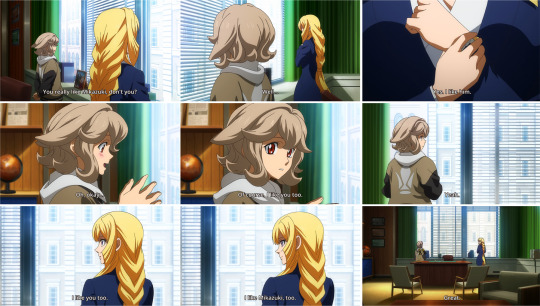
I don't know about you, but I find it extraordinarily hard to read this as anything other than a three-way love-confession. Still, in the interests of fair play, let's review the wriggle room for declaring this something else.
Kudelia Aina Bernstein and Atra Mixta are love interests of nominal protagonist Mikazuki Augus, in an iteration of another tried-and-true trope, that of a male lead inexplicably being attractive to the female characters in his orbit. Or rather, it would be if the show didn't take such pains to demonstrate why these girls fall for him, setting up a long-established crush on Atra's part (rooted in him being the first person in the world to be nice to her) and a mutual respect on Kudelia's that gets spurred to more when Mikazuki randomly decides to kiss her because she 'looked cute' (Mikazuki has the manners of a feral stray raised on the streets, because that's precisely what he is).
Justification aside, this has the makings of a traditional triangle, that is, one without a connecting base, which we might expect to be resolved by either Kudelia or Atra 'losing out'. For a few episodes, this does indeed seem where we are headed. Then Atra discovers the concept of polyamory via the polygamous Turbines group and all bets are off.

Having realised it is perfectly possible for a family to consist of multiple romantic partners, Atra proceeds to work towards ensuring everyone gets everything they want. Strictly speaking, this doesn't mean she is attracted to Kudelia as well – even if she clearly recognises Kudelia as an attractive person from the start and…
You know what? Acknowledging that the information about their eventual marital status was only stated in interviews at live events with no official record and seems to have been framed around raising the son Atra has with Mika, I'm going to abandon the pretence of both-sided objectivity and go straight for the throat. Turns out my patience for soft-footing this lasts about as long as it takes to say 'bi-erasure'.
Over the course of Season 1, Atra not only decides the end-game is some form of three-person wedding, she also:
Shows no jealousy over Mikazuki and instead chides him for not providing the correct emotional support to the girl he kissed.
Spends a great deal of time with Kudelia and enthusiastically throws herself into furthering Kudelia's goals, without necessarily understanding the technicalities.
Covers for Kudelia by pretending to be her during a confrontation with Gjallarhorn soldiers, getting herself soundly beaten up in order to prevent them from chasing after the real deal.
Drives an armoured car through a battlefield for Kudelia's sake, safely delivering her to a vital rendezvous.
Leaps in front of a massive mobile suit to push Kudelia out of its path, physically shielding the other girl with her body.
As much as it pains me to resort to the 'if this were a man and a woman, would it read as romantic' crudity – yes! Yes it would! Especially since in Season 2, Atra presents Kudelia with a good-luck charm bracelet she has woven, something she previously did for Mikazuki explicitly out of having a crush on him. I'm all for embracing platonic love (which is why Takaki and Aston are not featuring in this rundown) and there's nothing in the above list necessarily entailing attraction beyond deep friendship. But when Atra consciously repeats her actions towards Mikazuki (someone she goes on to definitely have sex with) with Kudelia and it leads to the scene between them where they declare how they feel about each other and Mikauki, looking for non-romantic angles takes more effort.
After all, if we are to read Shino's openness to Yamagi's affection from the things he says and how he looks saying them, we can certainly do the same for Atra and Kudelia's use of the word 'like' in reference to one another and their reactions to hearing it said of them. (Obligatory note that if there is some nuance in the original Japanese the translation doesn't capture, I'd love to hear about it. The English scripts, however, leave little to the imagination.)
It is indisputable that Atra feels a strong affection towards Kudelia and while I have been focusing on her a lot (she is by far the most proactive member of the triad), Kudelia reciprocates at every opportunity she is presented with. Even if there truly wasn't an intention to portray this as exactly equivalent to Atra and Mikazuki, the end result manages to be on par with Yamagi and Shino. Consider Kudelia and Mikazuki, for example. In terms of portrayal and the two-girls-one-guy trope being explored here, they have the same level of chemistry and the same absence of overt consummation as Kudelia and Atra, and it would hardly be a serious position to claim the show does not place the two of them in romantic conjunction, now would it?
You may at this point be wondering why I am getting so defensive of reading Kudelia and Atra as romantic partners. Honestly, I am too. On reflection, I think it's because IBO is playing around with such a worn-out and insipid means of wringing drama from characters who should know better, I keep searching for the catch. And yet there isn't one. This show really did respond to a nascent love chevron by having the mousy, homely girl tell the governor's beautiful daughter to shut up and get in the polycule, and turned it into a true triangle.
That's wonderful. I cannot properly express the wave of joy and relief that came over me when I realised this was the direction they were taking. It ends in tragedy, of course, Mikazuki giving up any chance of a peaceful life to die in battle, far away from the women who love him. But their lives continue because of his sacrifice and by all appearances they remain together. In some ways, for the overarching message of hope persisting on the back of heartbreak, the precise details of that arrangement don't particularly matter. So why not take the gayest reading possible?
What an excellent segue into a blink-and-you'll-miss-it, probably-stretching-too-far, nonetheless-compelling potential bit of queerness: Chad in the series epilogue.

One of the many tertiary characters in Tekkadan, Chad Chaden has minor speaking parts throughout Season 1 and a larger role in Season 2. He initially appears during a particularly dire early moment when it looks like everyone is about to be killed by attacking mobile suits. His obvious resignation to this fate sets the tone for a rather dour personality, at least while on the clock. Chad starts out as human debris, a person enslaved after a space battle and sold to the CGS military group as free labour. This gives him a very matter-of-fact attitude towards fighting and the kill-or-be-killed nature of being forced into it – he voices the sentiment that even when facing other human debris, they can't afford to show mercy.
Off the clock, Chad displays a more sensitive personality. He seems studious, learning about interplanetary communications from Kudelia's maid Fumitan and later being promoted to leader of Tekkadan's Earth branch. He has some difficulty acclimatising to being treated as a free person, proving unsure about the concept of wearing a smart suit instead of his normal fatigues. And he grows anxious when he returns to Mars to discover nobody told him two of the few adults in the group (Yukinojo and Merribit) had started dating, worrying that he's no longer 'one of the guys'.
The most we learn about his relationship preferences prior to the series epilogue comes in a comedic sequence about a third of the way into Season 2, when Shino suggests a trip to a local brothel. Eugene responds by proclaiming that he's realised money will not buy him true love. This prompts Chad to ask Merribit if this is true and, on her saying she supposes so, opts out of the trip as well. Judging by his body-language in the next frame where he appears, this is possibly a decision he regrets – perhaps owing to his anxieties, since he just passed up the chance for some team-bonding.
None of this is directly relevant to the topic of this essay. If anything, the scene I just described suggests that, like Eugene, Chad has previously gone along with Shino in paying for sex with women, only to discover he wanted more than just physical intimacy. But then we get the exchange in Kudelia's office during the last episode, following a time-skip after Tekkadan's defeat and dissolution. Now working for Kudelia as an assistant of some kind, Chad notes that Merribit is shortly to give birth to her and Yukinojo's second child, saying he and Yamagi intend to meet up later to plan a celebration. Eugene reacts with amused disbelief, accusing them of just wanting an excuse to go out drinking, to which Chad retorts, 'what's wrong with that?'
And the thing is he's blushing when he does. Which may simply be because Eugene is accusing him of slacking off – IBO characters blush all the time and their embarrassment is frequently to do with being caught acting immature or otherwise against how they want people to see them. But given the weight that 'drinking the night away' carries in regards to Yamagi following Shino's actions shortly prior to his death, it is easy to speculate this represents something more specific.
As far as I can recall, Chad and Yamagi do not interact at all over the course of the show's two seasons, meaning these lines present a rather unexpected combination of characters. Eugene would have seemed a more likely candidate to associate with Yamagi. He's positioned as Shino's closest friend, he comforts Yamagi over his grief, and they are together for much of the climax to the series' plot. So what has happened in the years since, that Eugene's teasing should elicit a blush from Chad instead?
If we put on our shipping goggles, it's far from a nonsensical pairing. Chad goes through an arc not too dissimilar to Shino's. He is knocked into a coma while protecting an ally from a bomb blast and subsequently the Earth branch gets swept into a war orchestrated by one of the factions within Gjallarhorn. On recovering, he blames himself for the many deaths that result, echoing Shino's line about thinking it better if he'd died in place of his comrades. On returning to Mars, he jumps head-first into mobile suit training, determined to make up for his perceived failure as a leader and cheering himself up through rigorous activity. Different though their personalities appear on the surface, there are clear commonalities here. Further, Chad's responses to his traumatic experiences have a more measured quality to them than Shino's. He is not nearly as reckless and provides clear directions to his comrades even while acting as a decoy against a dangerous enemy, rather than abandon any attempt to be an effective leader. Taken together, and coupled to a more long-term view of romance, these qualities might make him a 'safer' version of things Yamagi loved about Shino, creating space for them to be drawn together.
Or perhaps they're simply the most logical points of contact between the ex-Tekkadan survivors at the Admoss Company and Kassapa Factory and intend to make that an excuse to get companionably plastered for no greater reason than it being a nice time. I am speculating over a couple of lines and an animation choice. Nevertheless, it does not feel like unreasonable speculation. When we already have a veritable gaggle of characters who are queer or may trivially be read as such, it's hardly a stretch to assume one more.
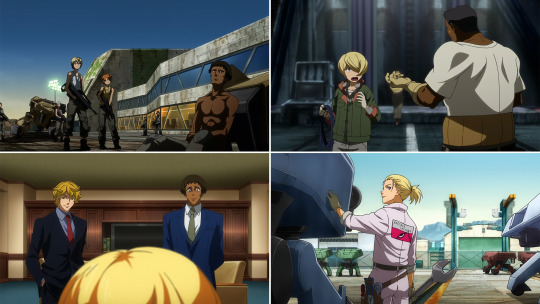
Chad/Yamagi doesn't appear to be a thread the fandom at large has pulled on much, likely because the pairing of Shino and Yamagi is so prominent, it eclipses a mere throwaway possibility. But I'm glad it exists within easy reach. And even if we take off our goggles, these lines demonstrate life for the characters has not stopped. The ex-slave and the gay kid are not stuck, trapped by the tragedies of their past. They have instead grown in both confidence and happiness and now have peaceful, stable lives where they're on going-out-drinking terms. That above all is why I wanted to explore this exchange: it reinforces Iron-Blooded Orphans' rejection of the idea the suffering people like Chad and Yamagi go through is perpetual or inevitable.
OK, one more character to look at. Let's talk about Orga and asexuality.
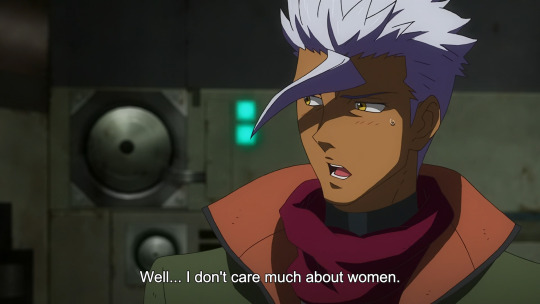
Orga Itsuka, leader of Tekkadan and instigator of the series' events, is notable for his charisma, his drive to provide a safe home for his comrades, and his complete unsuitability for the grown-up activities he attempts. Trying to party all night leaves him puking up his dinner. He forces himself into a suit and tie to handle the administration of a break-out paramilitary company, despite finding it stultifying and bewildering. His goals spin like a weather-cock, as he's surrounded by older characters possessing strong convictions while unable to stick to his own. And he is ultimately undone by an unwillingness to ask for help, having assumed that, as leader, he must decide everything alone.
I suspect his expressed lack of interest in women is intended to help convey overall immaturity. Orga is a good soldier and tactician, but he plainly isn't prepared for adulthood, lacking the grasp on the complexities of life that implies. Making him uncomfortable about sex serves to heighten the impression of a teenager trying to navigate circumstances for which he's not yet ready.
Relatedly, it should be stressed Orga stating he 'doesn't care' about woman is a response to Eugene asking if he agrees love and kindness are what's important, as opposed to Shino's endorsement of boobs. On hearing this response, Eugene proceeds to mock his commander for inexperience. That he himself has only just had his first sexual experience with another person and previously said much the same about not caring about sex simply proves hypocrisy is a fundamental aspect of Eugene's characterisation. The whole scene is very teenage.
Matters have not improved much when Orga and Eugene's dynamic is revisited in one of the side-stories released via the Iron-Blooded Orphans G mobile game. A year and change later, Eugene continues to act superior about having 'experience' where Orga doesn't.
Orga takes this rather poorly.

(Subtitles by @trafalgarlog)
Eventually Merribit has to shout at them to stop being brats, shaming them for behaving like argumentative children. It's funny – and then you remember they basically still are children and this is headed towards more carnage that will not spare them for being young. Such it is to engage with Iron-Blooded Orphans.
What does any of this tell us about Orga's sexuality? In principle, taking it as a device to convey immaturity, nothing. Orga's persisting virginity could simply mean he's not worked out this aspect of himself yet. He is a busy young man who likely hasn't had the time to try.
Alternatively it could mean he is gay. Mikazuki/Orga is an extremely popular ship in the fandom and we might take Orga's professed lack of interest in women as 'evidence' of him swinging the other way.
Or we could take my view, that Orga is asexual and his embarrassment is rooted in just not getting what the big deal is.
To immediately clarify, I don't think he is ace because he 'hasn't worked out what he wants', I think he's ace because he blushes on admitting he doesn't care about women and does not try to prove otherwise once he's in a position where he could easily do so. In circling back to the same joke for the side-story, the writers portray Orga as continuing to be uninterested in sex and sensitive over being needled about it. Again, a feasible interpretation is that he's into guys. Yet this is an argument with Eugene, whose response to the idea of Yamagi being in love with Shino is basically 'you mean you didn't notice?' Eugene is a dork and jerk; he isn't bigoted. None of the Tekkadan guys are. It's unclear if homophobia is even a factor in the setting. Sexism is, but when someone as superficially macho as Shino is comfortable with male/male attraction, and there are same-sex weddings inside Gjallarhorn, we cannot assume stigma exists around being gay. So why should Orga be worried, unless it goes beyond a question of who you're attracted to and into the answer being 'nobody at all'?
When you're surrounded by people who happily wax lyrical about how the joys of sex make you a real man, the absence of a libido might easily become a sore point.
Again, I'm supposing. Again, there is room to do so. As I touched on with Chad, it is easy to read queerness into the text when the assumption of straightness has been taken away, which is something this show does wholeheartedly and deliberately.
Orga Itsuka is one of the first characters I looked at and realised, not only shouldn't I assume heterosexuality, I shouldn't assume sexual attraction at all. I cannot credit Iron-Blooded Orphans alone with this. I do credit it with being a piece of media that applies itself to inclusiveness in ways quite remarkable for a show about giant robot fights, produced to market toys.
The word we want here is 'normalisation'. IBO has a lot to say about what constitutes 'normal' and a lot of it accords well with my own views, particularly those that have me twitching whenever anybody demands we 'be normal' about something. Normality is horrible. It is cruel and it is callous. 'Normal' is a world run on exploitation, on slave labour and on police savagery. Normal is children forced to risk their lives to earn the money required to feed themselves, because it is normal for their parents be gone, or incapable of supporting them. War is normal. Corruption of political systems is normal. Death coming more rapidly for those deemed expendable by society is very, very normal.
But so is protest. The drive to do something, to change things. The capacity for caring about each other. Love. 'Normal' is just a statement about what surrounds us every day, for worse and for better. In too many pieces of fiction, normality is narrowed, rendered a neater, cleaner picture, often excluding the kinds of people we might run into on the street, or walk past, or see on the news, distant and dehumanised.
Queerness is normal, yet for a long time it has been one of the first things to be cut out of fictional worlds. And when it is present, it's a big deal. An object lesson or a cry of triumph over breaking free of unfair strictures. I love stories about queer joy and victory. Heck, I'm a sucker for a good, soppy gay romance. But these aren't the only kinds of stories we tell. Sometimes we need to reflect the worst aspects of the world and what it does to normal people.
In attempting this, Iron-Blooded Orphans commits to an idea of 'normal people' that includes those who are gay or bisexual, those of colour and those we'd call white, the polyamorous, the illiterate, the desperate, the powerful, those who throw themselves into the fight with everything they have, and those who are simply kind. Those who are accepting, understanding and compassionate. Those who need to be accepted, who struggle to be understood, who suffer for a lack of compassion.
There are all sorts of people in IBO and – as a certain cheery, violent dumbass once said – man do I love it. I don't believe it is reading against the spirit of the thing to imagine more diversity than gets outright stated, to interpret one of the leads as ace or suppose another side character is bi or pansexual. It would seem entirely natural if they were.
Everyone's welcome here, down among the debris and the bloodshed, where hope is precious and fleeting and still somehow endures. So why shouldn't we raise a few extra pride flags?
Queer as in 'fuck you'
This all said, taken as a whole, Iron-Blooded Orphans is not a story about queerness or queer romance. Nowhere is this clearer than in its ending.
I skipped over the framing of the final scenes of the anime when I discussed Kudelia and Atra. They form a striking contrast with the ending of The Witch from Mercury, where the conclusion is directly focused around Suletta and Miorine's love for one another, their bonds of wedlock, and the happiness they have found together. This follows from the show being primarily about their relationship. In Iron-Blooded Orphans, the ending focuses not on Kudelia's feelings toward Atra, but those she has for Akatsuki, Mikazuki's son, with Eugene even saying she's eager to go see 'the man she loves', setting up a brief moment of uncertainty over who the character with Mikazuki's outline actually is.
The nature of Kudelia and Atra's relationship post-time-skip is implied rather than stated: in the English versions of the script, they do not refer to each other using terms suggesting they are married, although Atra has dropped her habitual 'Miss' from the front of Kudelia's name. They do not have wedding rings (redundant as those would be alongside the charm bracelets) and Akatsuki does not call Kudelia 'mom'. That they are raising him together is suggested very strongly, in line with Mikazuki asking Kudelia to be guardian of his child if he died. There are non-romantic ways of taking this idea, though, and none of these are closed off as viable interpretations.
But why should we expect some definite statement about romantic status when the point being conveyed is how Tekkadan's legacy continues to shape the world? This is a story concerned with the exploitation underpinning the world and the effort required to make even the smallest wide-scale change. It is about how people trapped at the bottom of the pecking order are still people, still human, messy and complex. It is about their pointless deaths, they ways they struggle on until those deaths come for them, and why they matter, even if the world forgets them.
Mikazuki, the living weapon, the human sacrifice for Orga Itsuka's reckless ambitions, leaves behind a child who will grow up in a more peaceful time, in a society slightly better off than when he and Orga were starving on Chyrse's streets. He doesn't live to see it; Akatsuki does. For all the failures, the attempt wasn't a waste. Don't you dare disrespect the people who died by saying it was.
This is where the epilogue centres, on Akatsuki and on Kudelia's cherishing of the world Mikazuki and everyone else built. Atra and Kudelia's relationship is there, a part of the gentler life they now have (Atra's desires were always towards the version of her existence where Mikazuki retires to a farm; here she fulfils the dream with Kudelia alone). It just doesn't need to take up space for the ending to land.
Yet, as I pour over how queerness is incorporated into Iron-Blooded Orphans, I find myself considering the struggles queer people face in reality. The victims of the AIDS crisis, dehumanised by indifferent institutions. Section 28 and the attempted destruction of knowledge around non-heterosexual forms of love. Riots and campaigns, voices raised loud and proud. How we are equated with dirt and corruption, reduced down to facts others find disgusting. The name-calling. The petty, pathetic posturing that makes everyday existence pointlessly harder.
So it goes for space-rats and degenerates alike.
I am lucky. My life is about as far from that of a child soldier as it is possible to get. My sexuality has been largely invisible. My gender matches the one most favoured by my society. I still have more common cause with those born in poverty on the other side of the world than I will ever have with the aristocrats and billionaires who shape the direction of my country. Because we hold many causes of misery in common. Because we share the same capacities for joy and suffering. Because our humanity is so easily cast aside by those we will never be able to touch.
There is always a place for stories uncomplicatedly about queer love conquering all. Equally, it is important to recognise the places queerness overlaps with stories about the many other ways the world casts people out. It is vital to be able to explore loss, futility and heartbreak. It is essential to capture why we strive onwards despite how heavily tragedy might weight us down.
We may be doomed. Our lives still matter. To ourselves, to each other and, whether they remember or not, to those who come after us.
So, no: for all the queer characters it contains and the many more we might trivially imagine queerness into, Iron-Blooded Orphans is not gay in the vein of The Witch From Mercury. It is not a happy story.
But it is a tenaciously hopeful one and, from certain angles, that alone looks queer as hell.
---------
Happy UK/US Pride Month – in honour and memory of Marsha P Johnson and everyone else who refused to go quietly.
I shall leave you with one of the least straight things ever to be included in any Gundam show.

[Index for further writing]
#gundam iron blooded orphans#gundam ibo#g tekketsu#tekketsu no orphans#gundam#turn a gundam#reference#notes#queerness#queer love#queer characters#analysis#spoilers#queer is a reclaimed slur and a term I apply to myself#heaven help you if you think this is the place to argue about that
69 notes
·
View notes
Text
I've been kind of following the Gundam lesbians vs Bandai controversy from the sidelines (ie: the main characters got married (offscreen) at the end of the series and the production team is supportive; Bandai censored the explicit mentions of marriage in a recent magazine and then said that everything is up to interpretation) and. In general it's a really good example of how oftentimes it's not authors who should mainly be blamed for the lack of unapologetic queerness in anime and manga (or anywhere else, for that matter), but those companies that they work for
Which leads me to

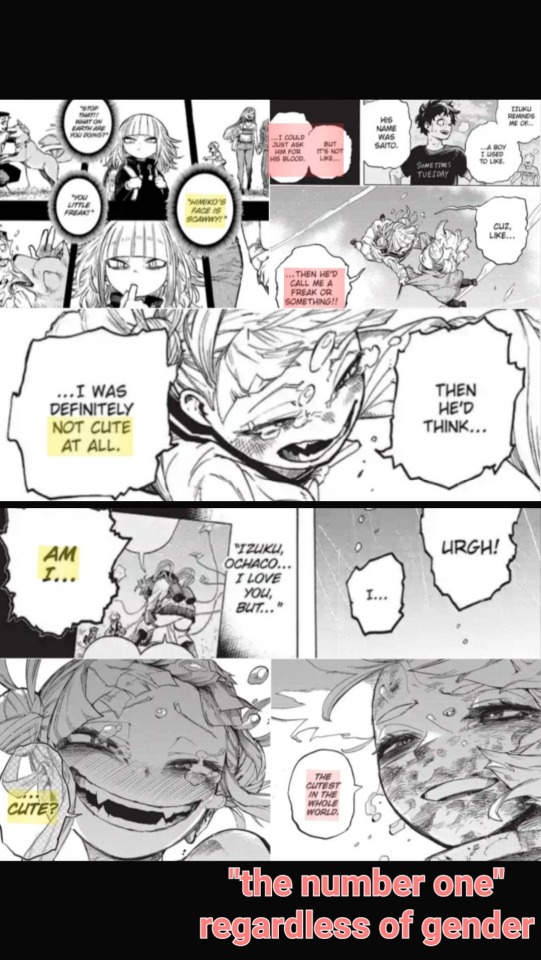
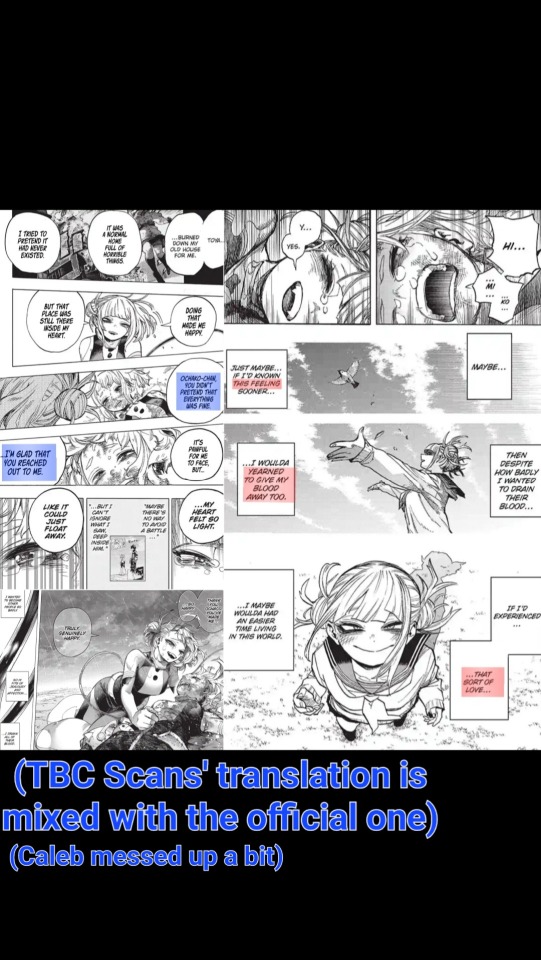

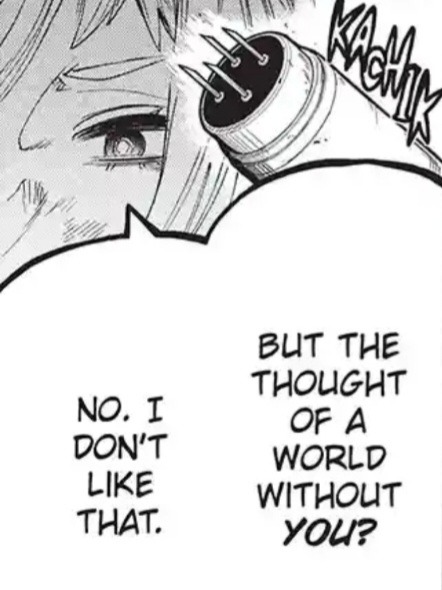

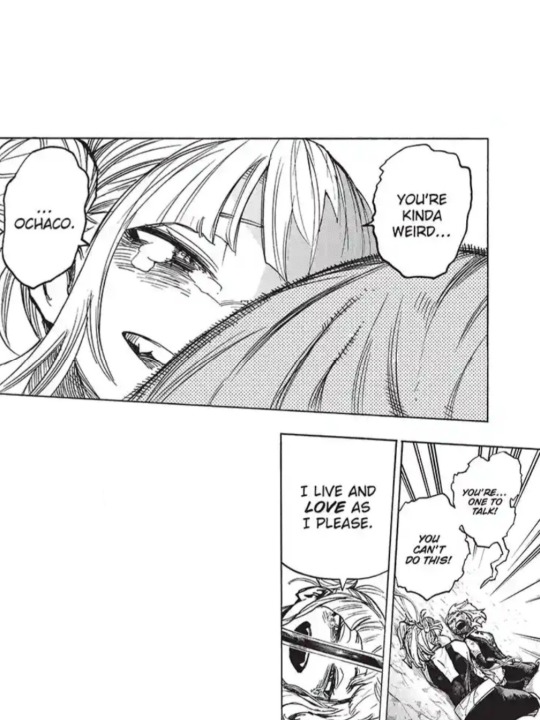
And as a side note I want to reiterate this but anyone who calls them "queerbait", "yuribait", etc is a stupid dickhead because Toga is bisexual and in love with Uraraka. THE QUEER IS THERE
At this point it no longer makes much sense to wonder whether the romantic undertones to Uraraka and Toga's relationship are accidental or not. I won't claim that they will definitely end up together together (although I've seen enough Japanese fans go crazy for how proposal-esque Uraraka got to, like, at least entertain the thought lol), but what I want to say is. Everything that happened between them is deliberately meant to be read as queer, romantic, and mutual. Uraraka may have not said "I love you" back to Toga in these same terms, but through her actions and words she has reciprocated her feelings. Yes, even if Those Assholes say that she's just lying, that anything that isn't spoon-fed explicitly confirmed is just a "delusional interpretation"
Even then, the supposed line between text and subtext is... a bit eyebrow raising, innit. Toga being bisexual and having feelings for Uraraka is text. Exchanging blood being equal to kissing to her is text. Her insecurities are text......... Uraraka wanting to give Toga her blood, thinking that her smile is beautiful, and that she's the cutest in the whole world is text. I feel like that strongly suggests something at minimum, no. And. Can we really call it subtext, or even coding, when characters do everything short of dramatically shouting "I gay-love you!" to each other? These are more of my personal feelings, and I know that this happens because We Live In A Society, so we tend to feel like things like these must be outright defined so that our queer interpretations can gain validity and the right to exist in the eyes of the majority (= the cishet audience), but... I do find this way of engaging with media rather stifling, especially because... people who hate us to begin with won't care if two manga girls declare their love to each other. Chances are that they will get angrier, actually, or that they will look for excuses to deny their love ("the author was pressured by crazy shippers", "akchually the wording is ambiguous", "the degenerate West is corrupting the purity of the East", you name it)
Still, I know. I know that there's a lot of hunger for undeniably canonical queer relationships (for obvious reasons! understable reasons!), but to circle back to the beginning of this post, pushing back against the system is hard. Bnha's ending is still a ways off, and no one can predict the future. We don't know if Horikoshi plans to stress even further/more bluntly within the manga that Oh, They 👭🏳️🌈, we don't know if Jump would allow him to, we don't know if such a thing would be met with opposition elsewhere/afterwards (see: what Bandai is trying to do now, after everything has been said and done).
Regardless, sought after explicit confirmation or not, they do have something, something that is very much there to anyone who's willing to embrace it for what it is: mutual, queer love. And they're sooo real 🩷💛
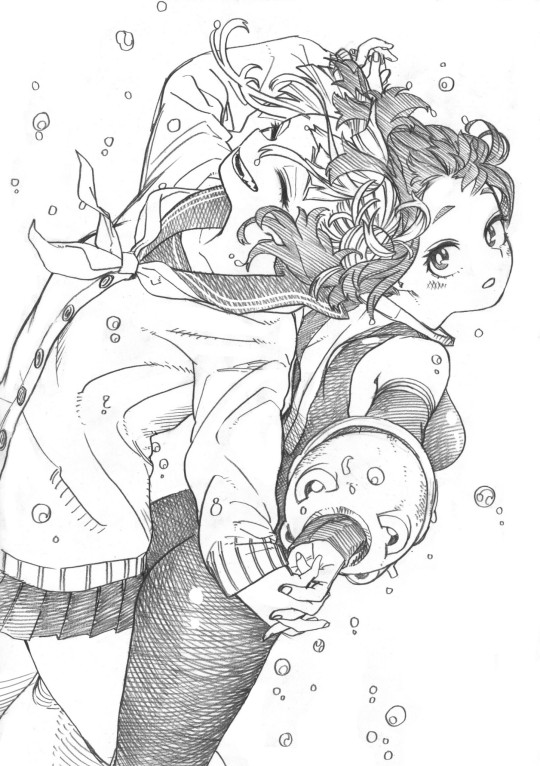
#bnha#togachako#animanga#mytext#and now we finally go to sleep. eepy.......#if tomorrow i'll wake up look at this again and find any typos i will end it all#long post
110 notes
·
View notes
Text
While I'm on a roll, I'm going to go off on a little bit of a personal rant (continuing something I mentioned earlier), that's been on my mind due to some comments I've seen made about G-Witch and Sulemio in recent days. I normally try to avoid writing rants like this but this one has been grinding my gears a bit.
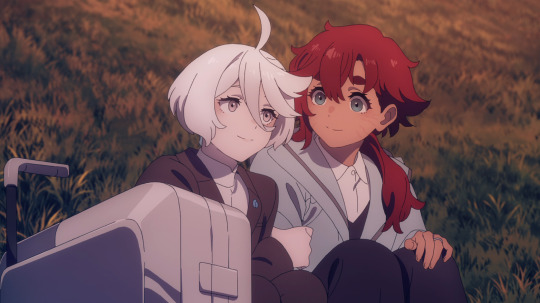
Yes, in the grand scheme of queer media, Sulemio's relationship can definitely come across as underwhelming. No one would deny that you can get more explicitly and textually queer stories out there, especially by queer creators. But that absolutely ignores some of the circumstances surrounding the show.
First, it's been made pretty obvious by now that the staff wasn't allowed to be very explicit in their depiction of Suletta & Miorine's relationship. The company that censored an interview and released a tone-deaf statement that their relationship should be "up to interpretation" because a VA said they were married obviously wasn't going to be cool with Suletta and Miorine kissing, saying I love you and getting married on screen. They would've put their foot down well before we got to the ending. And even then the staff did enough to make Suletta & Miorine explicitly married by the end of the show. They found ways around whatever limitations Bandai put into place to try and make Sulemio subtext, and made them a canon couple within the show itself. I get tired of people saying the show didn't explicitly and textually confirm their relationship and marriage because it does, just in a roundabout way via the "sister-in-law" line because they couldn't do it in a straightforward manner.
Seriously, by all accounts, it's not like the people making this show wanted to end Sulemio with "just handholding" and half-assed the relationship, they wanted to do more but couldn't. Just look at how some of the staff members depicted them in the artbook once they were off Bandai's leash: with multiple wedding pictures.
Second, it's actually a big deal that they ended the show married, even if they had to do it in a roundabout way. Yes, the yuri genre is generally going to have more explicit lesbian relationships than what we got with Sulemio, but the yuri genre isn't exactly mainstream. Dedicated yuri anime isn't airing in primetime and ending with the main couple married, it's usually late-night, niche and usually only gets one season that introduces the couple, maybe gives you a kiss, but forces you to finish the story through the LN/Manga. Mobile Suit Gundam is a popular, mainstream multi-media franchise that has been running for 44 years, and G-Witch was airing on prime time. The fact that a mainstream franchise like Gundam aired an anime series that was centered around a queer woman and a sapphic relationship that ended with the couple married is huge, especially considering the legal status of same-sex marriage in Japan. Niche yuri anime airing in the middle of the night can probably get away with a lot more gay content than a mainstream franchise airing in primetime can, especially when the franchise is owned by a bunch of old, conservative dudes.
As an anime fan, it's amazing to see a mainstream animated series like The Witch From Mercury focused around a queer woman and a sapphic relationship (and make it TEXTUAL, not relying on subtext to carry it), especially a series not specifically adapted from a yuri LN/Manga. And as a lesbian and a long time Gundam fan, seeing a major franchise I love like Gundam, that has always been dominated by male characters, air a series focused around a queer female MC and her relationship with another woman is a much bigger deal to me than a lot of random yuri series would ever be.
Reducing Sulemio to comparisons between other queer media or yuri series and how it's "inferior" to those because it lacked certain elements ignores and disregards the unique challenges and situation of The Witch From Mercury, and the way the staff fought to overcome those issues to deliver an explicit sapphic story ending in a married couple.
134 notes
·
View notes
Text
My Favorite Movies/TV/Anime of 2023
Going into 2023 I've done a lot more taking in art then in previous years and this section is all about the audio/visual/auditory art I've taken in this year and enjoyed. In fact it's a content and clickable top 10 list! Wow so engaging, much content, please enjoy. This is gonna be inclusive of movies, cartoons, anime, TV shows, etc because I don't engage any one of these mediums alone enough to make a nice little list, at least not this year.
These are roughly in an order by how much I enjoyed them but these are different pieces of art that hit you in different places for different reasons and no one piece of art here is like "Better" than the other. Ask me at a different hour let alone day and this list could be all scrambled.
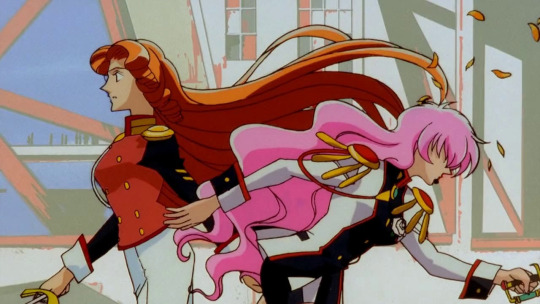
Adolescence Of Utena
So I finally watched some Utena, I mean I watched a little but of Utena before, just a few episodes with some friends but I watched the full ass movie now so that counts for something. The anime is really artful and it's a very compelling queer coming of age story with all the messy trauma and feelings attached. It's a weird movie, a girl turns into a car, and that's amazing, 12/10, another girl can also turn into a car, we're really just living the dream here. Finally true lesbian representation is when a girl can turn into a car and I am here for it. It's a really great piece of art and I am glad to have finally got to take it in and enjoy it.

Glass Onion
So this is probably the biggest surprise on the list for folks who follow me but one of my girlfriends really loves mysteries and so a Glass Onion I did watch with her. It's super funny and fun, it's just good. The cast has good chemistry, the jokes land, the mystery has fun twists, and it's just a good experience overall.
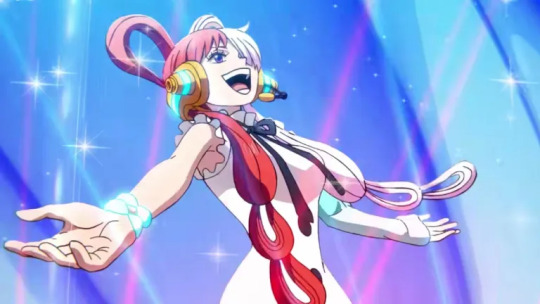
One Piece Film Red
I am not a One Piece fan, I do not care for One Piece, It's like fine Shonen. However, this movie fucking slapped, it was a good fucking time. Uta is One Pieces best character and she should show up and take over the final arc of the manga because she is so good. The music was fucking killer with Ado slaying every single fucking song and it really just hit. Every song is so good on it's own and in it's context. It's what you want from a truly killer musical experience and every song being from "the villain" is just extra fun. The power of friendship and bounds is really great here, it's just good and well animated even if the women all have the same exact body.
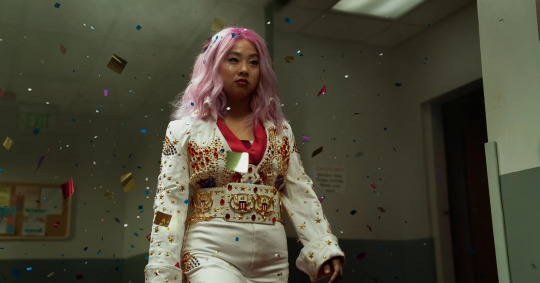
Everything, Everywhere, All At Once
I finally watched this movie after all the hype had died down and well, it was worth the hype, it isn't my favorite movie of all time but it's a good movie. It's funny, amazingly acted, well shot, silly and just in general a good time. It touches on a lot of good themes of family, trauma, homophobia, expectations, and parental relationships. I think the queerness coulda been better in the movie and have complaints on how that is displayed here but I mean it was at least a little bit queer and that's more than most movies. As a former actor who really loves the craft I envy everyone involved too for getting to be in such a fun film, I can only imagine what a blast it was to see the final product of what I am sure was a ton of hard work to make something so fun.
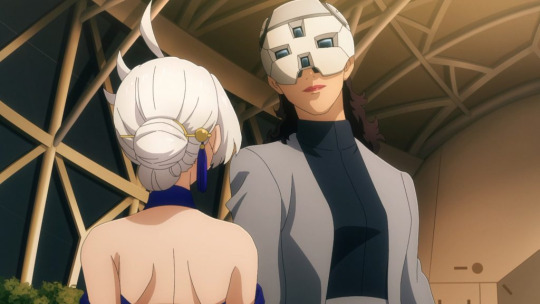
Gundam The Witch From Mercury - Season 2
Gundam ended on more of a whimper than a bang to me. Which is both not uncommon for a Gundam series to have a shitty ending but also not shocking given this series was given it had a much shorter run time. Regardless of me thinking this half of the anime is much weaker than the first half it still undeniably striking in it's animation, stunning visually, engaging to watch with a cast of very endearing characters to watch in the dramatic stakes of it all. The very end was not terrible but the time we spent to get to the final epilogue moments were questionable. Regardless, this show did not kill off Prospera, Chuchu, Secelia or Rouhi and they all were in a lot of these episodes so like an 8/10 cuz their all fucking brilliant and I really like Sulletta a ton too, I am just probably Mio's weakest solider among lesbians preferring my sweet little nervous lesbian settle down with a nice earthian girl or make use of her second hand to be polyamarous.
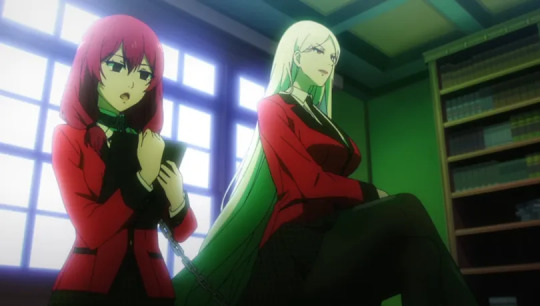
Kakegurui Twin
I never have and likely never will watch Kakegurui's main series but the twins series female focused cast and yuri energy captured my attention and so I turned it on. Wow, what a fucking ride. This over the top gambling game is Jojo's bizarre adventure, is sports anime, is card game anime, it's the raw spirit of these things radiating in the horny submissive lesbian factory and served back in animated form. The fucking faces these women get to make as they smugly battle in bounts of gambling is just so delicious and the tension they manage to put into each of these games of chance as the fucked up students try and cheat each other and win is just brilliant.

Harley Quinn
HarIvy is a ship of all time for me, it's hard to have the concept of a show be "HarIvy comedy" and me not to at least kinda enjoy it and I enjoyed it a lot this new season. At the start of the season I wasn't click with it, it felt weird and forced for Harly and Ivy to be placed in these really binary hero and villain roles but in the end that's what it was really about. Neither of them are traditional heroes or villains and the show actually recognized that and let them trying to fit into the strict mold of the universe as an active issue for themself, their sense of self, their relationship, the world and more. From time to time they felt fairly out of character but I am just happy to see this arcs over all themes and the work they put into that.
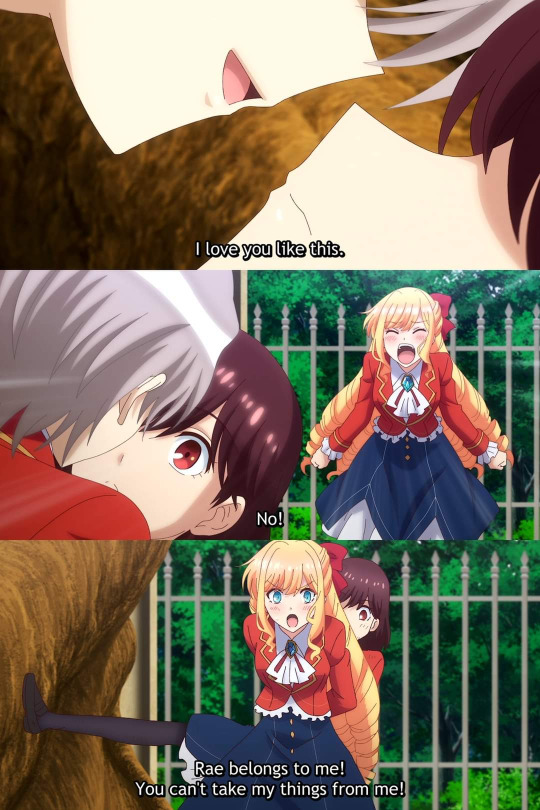
I’m In Love With The Villainess
While I would have rather had a tighter pace that went through the first two books of the series rather than one and some tiny jumps into the second book I'm In Love With The Villainess still managed to be one of my favorite things to watch this year with me viewing it multiple times. Rae's Isekai fantasy of being bullied by a hot rich woman and the eventual need to confront her own internalized homophobia and self pity as blocking her path to happiness are fun to see. Rae is really good in the anime adaptation and in it more than any other adaption it feels like everyone is friends and cares about each other which fits the light hearted comedy tone better than the light novels Rae will kill anyone for Clair, she has no friends mindset.

Scott Pilgrim: Takes Off
This was the biggest surprise of the year. I had grown out of Scott Pilgrim, while I was a fan of the comics before the movie was even a thing, I watched the movie before it even released, I even at some point was collecting the colored editions, I eventually soured on the series and sold everything I had of it. I wasn't excited about the anime and felt more like "let it go" then "OMG thing from when I was young" but hearing the good things I heard about it and about the Scott twist along with seeing the great animation in the OP I decided, fuck it why not give it a shot. So I did and wow, it's really good. It's a great take down, commentary, adaption, whatever it is of the original work. It is Scott Pilgrim having grown up alongside me, funnier than ever and a lot better about everything. I really loved all the changes and it still felt very true to the heart of Scott Pilgrim which is messy adults trying to fix their fucked up selves and relationships.
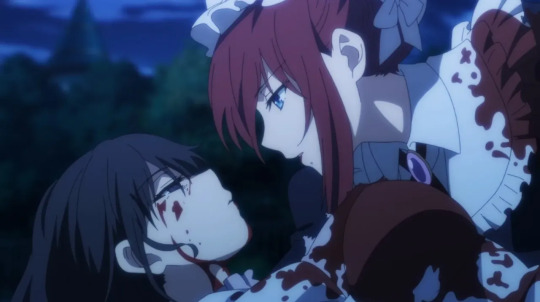
The Magical Revolution of the Reincarnated Princess and the Genius Young Lady
This certainly sits among my favorite anime of all time and very highly if not number one. MagiRevo mastered a light novel adaptations tempo perfecting how to make one season of what would be a nothing slow burn with no pay off at the novel and mangas pace into an exciting action packed yuri with more gay kisses in it than the rest of the years anime put together. It's funny, charming, fun but it also captures some really hard emotions too, I'll never forget the scene with Anis being pressured by old men to have children and stuff and the utter disgust she has at being treated like a piece of meat as she attempts to fill her role to the kingdom. It is devastating and heart wrenching and it just makes all the joy feel so strong.
If you want to help me enjoy more art then consider checking out my Patreon or Ko-fi and giving me a little bit of cash so I can do more of this kind of writing but also like make lots of my own art, art is hard to make and costs money and like maintain my chronically ill and trans body also takes money so anything helps, thank you. If you want more details on any of these I do have reviews for many of the pieces of art above but you can also let me know you want more and maybe I'll write more.
#the magical revolution of the Reincarnated Princess and the Genius Young Lady#magirevo#yuri#yuri anime#scott pilgram takes off#scott pilgrim#glass onion#Utena#adolescence of utena#One Piece Film Red#everything everywhere all at once#Gwitch#gundam#gundam witch from mercury#gundam the witch from mercury#Kakegurui Twin#Harley Quinn#i'm in love with the villainess#iltv#2023#Best Of 2023#top 10#Top 10 2023#Anime 2023#Shows 2023#Movies 2023
12 notes
·
View notes
Text
Neon Genesis Evangelion Part 1
To be honest, I’ve never seen this show and I’ve never actually been interested in watching this show. I’m not a fan of anime that focus on fighting and battles, nor am I a fan of mecha anime, so there wasn’t really anything about it that intrigued me. But still, I watched the episodes, and to be honest, although I wouldn’t consider myself a “fan” of this show, I liked it a lot more than I thought I would.
Neon Genesis Evangelion is a futuristic anime that is set in a world where humans are battling against Angels, otherworldly creatures that come to attack Earth. To combat them, humans have developed mecha weapons called Evangelions. It revolves around Shinji Ikari, who is the son of a high ranking commander of the organization that developed the Evas.
I noticed some similarities between this show and some of the other ones we have watched, specifically Gundam and Wandering Son.
To begin, the general concept of this show shares similarities with the Mobile Suit Gundam series. In fact, it is almost exactly the same concept. But beyond that, in both series, the protagonists, Shinji in Evangelion and Amuro in Gundam, are young and relatively inexperienced. The choice of having youthful pilots seems to be a recurring theme in these anime, possibly to emphasize the emotional and psychological challenges they face and the negative effects of war, especially on those who were innocent. Shinji, like Amuro, initially hesitates to pilot the Evangelion, but eventually agrees to take on the responsibility, primarily because of pressure from his dad.
But as Shinji pilots the Evangelion, he experiences significant mental stress, which is a little bit different than Amuro, who kind of grows into his role. But either way, this anime highlights the psychological impacts that giving the responsibility of killing others to people has on them.
Furthermore, both protagonists have complicated relationships with their fathers. Shinji's father, Gendo, pushes him into piloting the Evangelion, despite the fact that Shinji doesn’t want to. In fact, it seems like the only reason his dad wants him around at all is simply to pilot the Eva, which is very sad when you think about it, especially since young children often look up to their fathers and want to be like them. Similarly, Amuro's strained relationship with his father also adds an emotional layer to the story, and serves as a sense of motivation for him piloting the Gundam. But after Shinji's first battle with an Angel, Gendo coldly disowns him, leading Shinji to find shelter with his superior, Misato Katsuragi. In conclusion, his dad sucks.
I also noticed some similar themes to the past few anime we have seen, such as Wandering Son and Aggrestusko, especially when it comes to the presentation and portrayal of gender. The reading talked about masculinity specifically, and how there is more than one kind. The other reading talked a lot about queer masculinities specifically, or the ways in which many straight men display masculinity outside of the hetero-normative stereotype. I think that Shinji definitely falls into this category. For example, Shinji doesn’t want to pilot the Eva, it seems like he primarily does it to appease his father and the people around him, wanting to appear more masculine and strong in a time of crisis. But unfortunately, he develops PTSD from piloting the Eva, and tries to run away. I also noticed that one of the monsters that he was fighting was… suspiciously shaped, which could be a reference to him fighting this idea of masculinity that is being pushed onto him. People even criticize him for responding to orders with “yes ma’am” which is a polite thing to say, but apparently not masculine enough. I think that a great foil for Shinji’s character is that of his father, who is cold, harsh, strong and unfeeling, and has no qualms about sending teenagers out to fight and possibly get killed. He is kind of this ultimate form of masculinity, and maybe that is why he disapproves of his son so much.
I don’t like this anime, but I don’t dislike it either. I am hoping that with more episodes it will become more interesting to me, but in general this type of anime isn’t one that usually piques my interest. Still, I know it is quite popular and I’m glad I gave it a try.

0 notes
Text
I see somebody already mentioned Setsuna (00) and Suletta herself (GWitch) with regards to your tags about Loran and protagonists of colour in Gundam generally. Daryl Lorenz, duotagonist of Gundam Thunderbolt should probably also count (I don't think he has a precise origin given beyond 'space colony but he's designed with a prominent afro). Which feels a bit like quibbling for the sake of it, but hey, the variety is actually kind of cool.*
To quibble with more intent, I do think it's genuinely unfair to call -- as it sounds like the person you were talking to did -- the representation in GWitch 'forced'. I'm tepid on the show at best but I think it does a decent job of centring a fairly sweet lesbian romance. Sure, Suletta being given the initial 'only hicks think women can't marry women' speech is clunky and clearly aimed at the audience. But past that, the emotional drama is the thing the show is about and I think the story would feel very different if one (or both) of the leads was male. Miroine's whole deal is heavy on the gendering with how her father belittles her and the ways in which she's presented as a non-combatant, while Suletta's initial mousiness in the face of belligerent male rivals might also be read the same way. There is enough there that it never seemed to me the casting choices (so to speak) were handled without thought.
Perhaps that's not what you mean. I admit I struggle with the concept of 'good' representation as a metric because it's such a wildly subjective measuring stick. I should further admit to finding the concept of 'forced representation' to be therefore useless and honestly a bit of a red flag (the other reblog I mentioned made this point well). This being said, I do find it very striking to make the comparison to Turn A, because that's the one I've always found quite fascinating to look at through the lens of 'representation'.
Because, yes, it has the earliest explicitly homosexual character in the Gundam series. He is also someone who imposes his desire on the main protagonist in a high-handed, non-consensual manner. Which the show presents as wrong, having him ultimately called out for filtering his feelings through the mores of his society and trying to feminise Loran as a result. And while that is an interesting plot tied in extremely well to Guin's overall arc and the themes of the show, it also carries with it a lot of thorny baggage in terms of depictions of gay people. I am, to be clear, not saying that I don't agree with you in terms of how Tomino approached his work. It just feels a bit egregious to play with those particular characteristics in isolation. There're no other gay characters who aren't constantly misnaming the object of their affection, for example.
Likewise, Loran shows little qualm about cross-dressing (or nudity), but he's firmly heterosexual in terms of his actual, textual attraction(s) (the man is Dianna-sexual if anything). So for all the things Turn A does well -- and it does a lot more I like better than Witch From Mercury -- it doesn't achieve anything quite so bold as centring a queer relationship and saying that such things are absolutely unremarkable.
Please don't think I'm writing this to disparage anyone's preferences or the ways certain stories resonated with them. For my own part, I find Turn A to be a vastly superior work, which is the reason I've been mulling over your post all afternoon. Turn A is much more competently told, with a much more coherent (and personally preferable) message. Nevertheless, a lot of what it does with 'queer rep' is far more limited than placing it front and centre without caveat. And yes, I know they tried walking it back with GWitch for the sake of whatever corporate politics they had to appease, but I've watched the show: it's not subtle. The relationship is 100% text by any rational analysis of an animated production. That's . . . nice to see, even if it didn't land for me.
I think Gundam has often been pretty good at telling global stories populated by characters from different countries and ethnicities, with different body types, different desires and so on. It has numerous explicitly queer characters at this point, at least two explicitly queer relationships and a lot more it takes very little to read as such thanks to the symbolism and coding involved. That is something Tomino and the rest of the original teams absolutely deserve credit for setting in motion. But some of the later shows have pushed this stuff further and been more unambiguous about stating the normal variety of human experience. However much I like Turn A, I wouldn't want to hold it up above those others in that regard.
-------
* I was curious so I looked into this a bit further; going by the Wiki, of the other protagonists, Doman and Heero are explicitly of Japanese descent; Kamille was born in Tokyo (but parents Hilda and Franklin, and Hilda is from Sheffield); Hathaway is at least half Japanese, on his mother's side; Gerrod is from North America but his design is very much default anime protagonist; and while Amuro settled on being at least half Canadian post movie compilations, he was earlier stated to have been born in Japan. Then there's Alfred, Shiro, Kira, Shinn and Mikazuki (all of whom we might safely assume are meant to be Japanese or of Japanese descent), and Athrun and Seabrook (blue hair, green eyes, could still be assumed Japanese by anime conventions?). Meanwhile, Jona and Rita appear to be specifically white Australian, and Bernie is most likely white American by descent, but I think Judau, the AGE kids, anime!Banagher and Io fall into 'ambiguous'? That is, they are *could* all be read as white or at least mixed race but their designs are such I wouldn't want to commit to it. Oh and then there's Char who thanks to Origin we have to count. The man's a walking Romanov expy using the name of someone from Neo Texas, so . . . yeah. Probably white? I think?
At a certain point we hit Japanese anime = default is Japanese if not stated otherwise/heavily visually indicated otherwise and hair and eye colour do not count in the absence of other cues, and I lose all confidence in making the judgement. Hopefully somebody else out there can give a better answer about the vagueness above if you're interested.
i think Turn A Gundam handles its “representation” really well, Tomino set out to make a final gundam series and he didn’t want to end it on a bad note and he ended up fighting and getting into heated arguments with some of the crew while on production of the show just to make the characters he wanted to and to not make Turn A a shallow series. a point brought up by someone in a gundam server i’m in talks about how the representation in the show doesn’t feel forced and then retconned like in WFM and fanmade like the gay representation in 0079 and zeta, by tomino making multiple characters in turn a queer and non gender conforming and keeping it not as “representation to be representation” but as a natural element of humanity and just how people are years later can it be fully appreciated and seen as true representation
#gundam#more rambling#writing#things I am unsure about posting on Tumblr because they fall into the category of:#this made me think a lot#but a lot of this stuff *is* very subjective#even if we should be clear about what a particular work is textually *doing*
15 notes
·
View notes
Text
Anime For Beginners: Best Genres and Series to Watch
https://ift.tt/2N0s0pf
The past decade has seen anime’s popularity increase in dramatic ways, whether through a much broader spectrum of series receiving dubs, the growing success of anime feature films in theaters, or the sudden prominence of streaming services. There’s never been a better time to be an anime fan and the medium has become more accessible than ever. There’s a lot of anime out there, but the wealth of new series can often blend together or not be given a fair chance. Additionally, there are definitely certain types of anime that are more prominently showcased outside of Japan.
Read more
TV
How to Watch Anime Online: The Best Legal Anime Streaming Options
By Daniel Kurland
TV
Upcoming Anime 2021: New and Returning Series to Watch
By Daniel Kurland
For the uninitiated it’s easy to assume that anime consists of giant robots, monsters that battle, and strong fighters and magical girls that transform, but that’s really just a fraction of what the medium has to offer. Words like shonen, shojo, isekai, and even reverse harem are used in reference to anime, which can sometimes feel overwhelming when someone just wants to watch a silly romantic comedy or superhero clone. Here’s a helpful breakdown of all of the major anime genres and where to get started with them all.
Shonen
The shonen genre is by far the most popular brand of anime and the majority of breakout hits and major successes like Dragon Ball Z, Naruto, and One Piece all fit into the shonen brand. What’s interesting about anime genres is that they’re treated more like demographics and shonen is content that caters to boys with a young male protagonist. Shonen is so accessible because beyond this basic disclaimer, it’s able to cover a wide berth of content and a show like My Hero Academia can be completely different from Yu Yu Hakusho, yet they can still fall back on the same values.
Shonen anime has largely been generalized to be series that feature lots of fighting and battles, which isn’t always the case, but has become quite representative of the genre. Shonen series are ideal for people that want lots of action and are hungry for a show that has hundreds of episodes to consume.
Notable Series To Watch: Yu Yu Hakusho, Hunter x Hunter, My Hero Academia, Demon Slayer: Kimetsu no Yaiba, Attack On Titan
Shojo
Shojo is the female counterpart to the shonen genre that caters towards an audience of girls rather than boys. The shojo genre isn’t entirely bereft of battles, but it’s a style of anime where relationships and emotional drama is the priority or the source of power. There are many eclectic kinds of shojo series that are content to explore awkward relationship drama where there’s typically some kind of atypical supernatural element afoot.
Read more
TV
The Resplendent Queerness of Sailor Moon
By Michael Mammano
Culture
The Sailor Moon / Buffy the Vampire Slayer Connection
By Michael Mammano
However, the most popular style of shojo that’s largely become emblematic of the genre are “magical girl” series where regular girls transform into powerful warriors. There’s also typically a bright and pastoral aesthetic to shojo series and characters, both female and male, are beautified. Shojo anime is absolutely the place where the power of love will triumph over evil.
Notable Series To Watch: Sailor Moon, Cardcaptor Sakura, Fruits Basket, Vampire Knight, My Love Story!!
Seinen
Seinen is the R-rated evolution of the shonen genre that’s geared towards a more adult male audience that can handle mature storytelling. That’s not to say that shonen series can’t be violent or deal with adult situations, but seinen series often center around antiheroes and adult characters who are disenfranchised as opposed to optimistic youth that want to save the future.
Some of the most sophisticated and challenging anime series come out of the seinen genre and it’s a great place for people to jump in that are looking for a story that’s not overly drawn out and achieves the same dramatic peaks as prestige television. Seinen once more comes down to the viewers’ preferences and there are science fiction, horror, and fantasy seinen shows that all deconstruct their material in different ways. As a point of comparison, major anime movies like Akira or Ghost in the Shell both fit into the seinen genre.
Notable Series To Watch: Kill La Kill, Berserk, Ping Pong The Animation, Vinland Saga, Dorohedoro
Josei
Josei is the more mature version of shojo content and it’s full of series that are designed for women as opposed to girls. Romance is a big component of josei series, but it’s more concerned about the harsh realities behind relationships than the flirtatious courtship that kicks things off. Josei love stories are messy and full of heartbreak and they’re less romanticized than shojo’s interpretation of love.
A trashy way of putting it would be to say that Twilight is shojo, but Fifty Shades of Grey is seinen. Matters of the heart don’t always have to fuel josei series and there are also plenty of shows that center around adult women as they negotiate through professional and creative endeavors. It’s a place to find less flowery female-driven stories.
Notable Series To Watch: Chihayafuru, The Gokusen, Honey And Clover, Nana, Princess Jellyfish
Isekai
The isekai genre is perfect for fans of fantasy and this style of anime has become wildly popular over the course of the past decade. Isekai anime is any show where a character gets transported away to a fantastical new world. It’s a classic storytelling idea, but anime has been able to run with it in some creative new ways. There’s an abundance of isekai series that incorporate video game aesthetics and there are now just as many series where characters are trapped in a video game world than some alternate fantasy dimension.
Isekai can focus on the protagonist’s mission to return home, act as a savior in their new world, or simply kill time and enjoy the vacation. There are even reverse isekai anime where a supernatural character gets stuck on Earth and must acclimate. Arguably the biggest most mainstream example of isekai content is Spirited Away, but even something as foundational as Alice in Wonderland would qualify.
Notable Series To Watch: Overlord, Re: Zero – Starting Life In Another World, That Time I Got Reincarnated Into A Slime, KonoSuba, No Game No Life
Ecchi
Ecchi is that brand of anime that’s generalized to be the oversexed content that’s likely to make someone blush if they were watching it in public. Ecchi is any sort of anime series that prioritizes a certain sexiness and isn’t afraid to showcase its assets and indulge in “fan service.” Ecchi anime usually has a lot of skin on display, but it’s far from empty content and there’s an important distinction between something like this and actual pornography.
Read more
TV
Demon Slayer Review: Netflix Anime Reinvents Classic Action Tropes
By Daniel Kurland
TV
What Makes Eden Netflix’s First “Japanese Original Anime”?
By Kayti Burt
Ecchi series titillate, but they still are concerned about their story and characters. There’s inevitably going to be some overlap between ecchi and seinen content (Kill La Kill is a series that really tows the line between both), but there’s often more of a gratuitous playfulness that drives ecchi content. Sexualized characters may bring in the audience, but the series are still deep enough to maintain their interests.
Notable Series To Watch: High School DxD, High School Of The Dead, Rosario To Vampire, Strike The Blood, Prison School
Mecha
Mecha anime are widely prominent and the visual of gigantic robots locked in combat as they fly through outer space feels like a tentpole of the anime industry. There’s a large awareness towards mecha series and it’s even entered mainstream live-action content through works like Pacific Rim. However, this visibility also makes mecha content easy to generalize and some may write it off without understanding the versatility of the genre. Mecha anime can be broken down further into real robot and super robot series, each of which apply a different level of realism to these unrealistic creations.
Real robot series might focus more on the humans that pilot the machines and the politics that surround mecha, whereas super robot content can feature robots that destroy planets with giant lasers. There can be a lot of gratuitous action in mecha series, but the human element in shows like Appleseed and Neon Genesis Evangelion, or how various Mobile Suit Gundam properties are dedicated to the casualties of war, is proof that mecha anime can be a lot more than just giant robot battles.
Notable Series To Watch: Mobile Suit Gundam, Tengen Toppa Gurren Lagann, Appleseed, Mobile Police Patlabor, Neon Genesis Evangelion
Harem
Romance is popular in any medium and there’s often exceptional tension that’s created from out of a love triangle. One genre of anime takes that idea and seriously exaggerates it in a way that can sometimes be problematic, but has spawned a popular style of anime all the same. Harem series center around a hapless male protagonist who stumbles into some incredible situation where a large group of girls–all of contrasting personalities–fall head-over-heels in love with him.
Harem anime can come across as baseless wish fulfillment fantasy, but the broad structure allows many other genres to mix together with it in a productive way. A lot of the time these series will center on the actual characters and the complex relationship dynamics involved and try to say something that may not be explored in a josei or ecchi series. There are also reverse harem series, which take the same idea, but flip the genders where multiple men fawn over a woman.
Notable Series To Watch: Tenchi Muyo!, The World Only God Knows, Nisekoi, To LOVE-Ru, Ouran High School Host Club
Gag
Anime series are able to achieve a lot of things that just can’t be accomplished in other forms of animation or programming. Comedy is something that’s able to connect extremely hard in anime and operate at an absurdist level that uses visuals, timing, and premises that are rare to find elsewhere. Many anime series have a sense of humor or are even specifically designed as comedies, but gag anime are a different breed that operate at an overwhelmingly relentless pace.
Reality and the fourth wall are just things to break in gag series, which often engage in wild parodies and lampshade anime as a whole. Some gag anime have extended storylines, but they often operate in shorter vignette style sequences that allow the comedy to really pop. Gag anime thrive in pop culture references and some of the hardest times I’ve laughed in my entire life have been at gag series like Mr. Osomatsu and Gintama where comedy is king.
Notable Series To Watch: Gintama, The Disastrous Life Of Saiki K, Pop Team Epic!, Mr. Osomatsu, Excel Saga
Slice Of Life
Slice of life anime are those endlessly soothing series that don’t try to create major spectacles where the planet is at risk, but instead celebrate the mundanity of life. Slice of life series may center around the staff at a job, a group of friends in a high school club, or just a loner that’s moved to a new community. These are series that elegantly display the tiny moments that make life important and the bonds that create eternal friendships.
The stakes are often more muted in slice of life anime, but that doesn’t mean that they’re without tension or can’t dabble in fantastical material. There are still slice of life anime series that involve magical creatures or are set in unbelievable worlds. It’s sometimes even more humbling to learn that some planet in a far away solar system has a struggling chess club or that a dinosaur can be obsessed with different brands of candy.
Notable Series To Watch: The Melancholy Of Haruhi Suzumiya, Toradora!, K-On!, Dagashi Kashi, Clannad
cnx.cmd.push(function() { cnx({ playerId: "106e33c0-3911-473c-b599-b1426db57530", }).render("0270c398a82f44f49c23c16122516796"); });
The post Anime For Beginners: Best Genres and Series to Watch appeared first on Den of Geek.
from Den of Geek https://ift.tt/36K7IaW
2 notes
·
View notes
Text
Final Thoughts - 2018 Long Shows
It’s finally here! I’m so close to being done with 2018 (...mostly. We’ll get to it) that I can taste it, but in the meantime, this list is gonna be weird, because there will be things that were already on other lists since I revised my rules of what should be classified how. This post is specifically for any show that ended in 2018 and lasted longer than 13-ish episodes (including shows that aired a second season during the same year or within six months of finishing the previous one), which means that there’s about as much on it as a usual season of shows, but they all had more time to impress - or disappoint me. I’m doing a better job in recent seasons of getting to everything, but last year there were unfortunately things that I missed (I was burned out in the winter) and just have to leave aside for now because I can’t wait any longer for these lists.
Anyway! As usual, let’s start with what I skipped!
* The Seven Deadly Sins: Revival of the Commandments, The Disastrous Life of Saiki Kusuo S2, Cardcaptor Sakura Clear Card, Garo: Vanishing Line, and Mr Tonegawa: Middle Management Blues because I haven’t seen their previous seasons or parent works. (Yes, even Cardcaptor Sakura. Y’all can shoot me later.)
* Hakyuu Hoshin Engi, Beatless, and Basilisk: The Ouka Ninja Scrolls because by the time I was rounding things up, I hadn’t heard a single positive thing about any of them.
Next comes what I dropped -
WORST OF THE YEAR: Steins;Gate 0 (4/10)
What a fucking mess this show was. Aside from a very noticeable downgrade in production talent from its predecessor, the plot meanders and flirts with maybe actually happening this time before just dropping out again, over and over, to the point where I was perfectly willing to drop it two episodes from the finish line because it was such an insult to fans of the original. (Also, continued disgusting mistreatment of the transgender character.)
Gundam Build Divers (4/10)
Taking the Build series from being a well-written kids show to an averagely-written kids show that hides itself in decent mech designs.
Katana Maidens (4/10)
I remember so little about this show, and granted that I did drop it after one episode almost nine months ago, but what I did remember was that it gave me strong KanColle vibes with laughably inconsistent animation and flat characters. Meh.
Darling in the FRANXX (5/10)
This should probably be lower on the list, but I got out of Darling while the getting was good, sixteen episodes in. I understand that future episodes of the show cemented it as crappy right-wing nonsense in addition to pushing worldbuilding out of its fortieth-story window, but the moment it lost me was much sooner, when the crazy yandere female lead was reduced, almost instantly, to Good Anime Waifu as a reward to the protagonist for going against his friends with his selfish motives.
Persona 5 the Animation (5/10)
In addition to not actually finishing in 2018, Persona 5 just did not give me a single reason to watch it when I’d already finished the source game, with middling-to-bad visuals (thanks to the switch from Production I.G. to A-1 Pictures, and not even the team that created the much better-looking Day Breakers OVA before the game was released in the U.S.) and phoned-in music, which is especially unacceptable in a Persona adaptation. Also, we all absolutely called that the studio couldn’t tell the story of the entire game in just 26 episodes.
Record of Grancrest War (6/10)
There’s people that like this one a lot, but I didn’t see much that interested me in the first two episodes. I’ve heard better things about the manga.
Golden Kamuy (6/10)
I had problems with the first half of Golden Kamuy that the second half simply didn’t fix, and it became difficult for me to keep watching - the show still interrupted almost every fight scene with a dick joke, but still wanted to maintain a serious and occasionally frightening tone - and those things simply don’t go together. It needed to either spend more time being funny, or keep its lowest-common-denominator humor out of the fights.
Next, I have two shows that are (potentially permanently) On Hold, simply because it’s time for me to move on and I don’t have the time or energy to marathon them when the Winter shows are starting to wrap up:
Kakuriyo: Bed & Breakfast for Spirits, because even though I initially dropped it, I’ve heard a lot of good things since and I want to eventually give it another shot.
Yowamushi Pedal Glory Line, because despite the fact that I still enjoyed the previous season, this one started right in the middle of my burnout and I only heard bad things about it. I’ll get to it eventually, but it’s a shame that this series has been on a clear trend downwards since its revival.
And finally, the stuff I finished!
The Ancient Magus’ Bride (6/10)
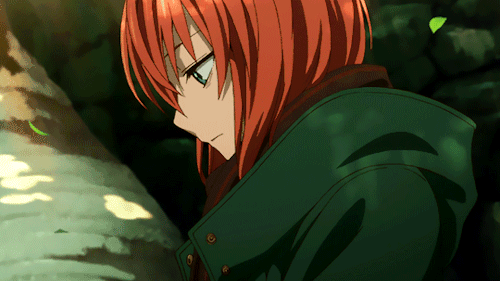
Keep in mind that this is here entirely on the merits of its aesthetic and its side characters - in the end, Ancient Magus’ Bride is a Beauty and the Beast story where the beast gets what he wants without learning to be less of a dick or even apologizing for his clearly wrong actions.
Major 2nd (7/10)
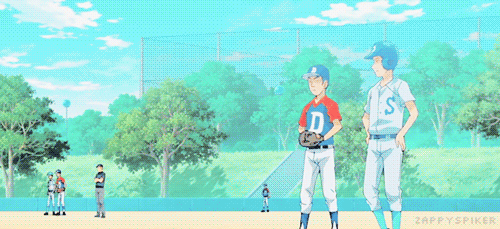
Always pleased to have even just Good sports shows around, and this one is a very effective reboot of a classic series that’s never made its way stateside (man, the underperformance of Big Windup! really did a lot of damage to this genre in the West). With good character development and a decent second-generation premise, Major 2nd has the potential to be the beginning of a solid baseball story, assuming that it gets a needed followup.
IDOLiSH7 (7/10)
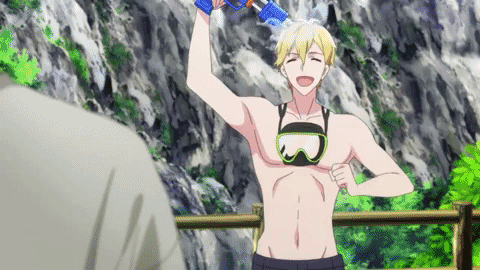
I dropped IDOLiSH7 when it first aired, and though I wound up enjoying it after I was very strongly urged to revisit it, the problems it started with never quite left it behind - that is, it has an okay cast of characters but doesn’t present even passable performance sequences, and if you’re going to include big song-and-dance numbers, they have to be good, or you may as well just be UtaPri.
ClassicaLoid Season 2 (8/10)
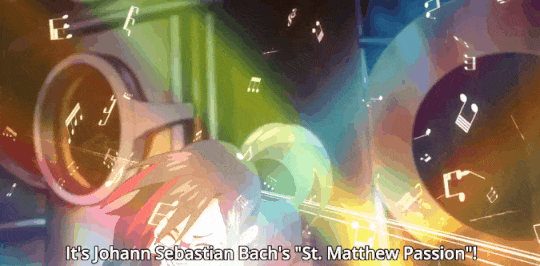
In 2017, I gave the first season of ClassicaLoid a near-perfect 9/10, and while this season gives us a satisfying conclusion to the story, it does things both a little better than the first, and also not quite as great. It’s story is much more well-integrated over the runtime so it doesn’t happen all at once in a few chunks, and the jokes that work are still absolute genius, but there’s simply too much that doesn’t quite land correctly, and a little too much immature humor, for it to reach the same lofty Hall of Fame heights as the first season. Still, one of the most underrated shows I’ve ever seen.
My Hero Academia Season 3 (8/10)
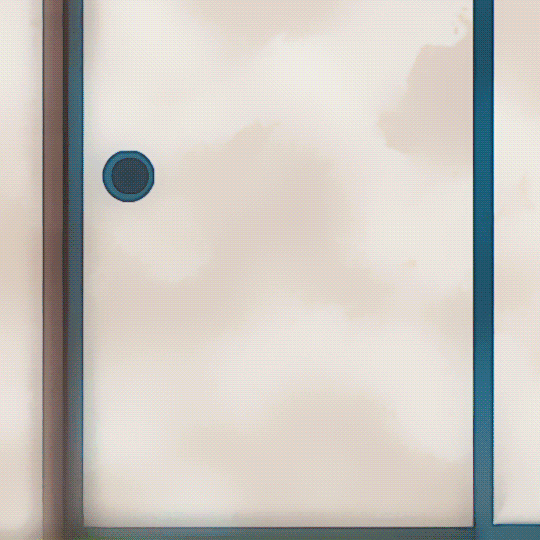
God, Izuku in that onesie is too damn cute.
My problems with Hero Academia are frustratingly persistent - the show is at its best when the students are competing with other students, because outside of last season’s Stain (a villain whose motivation is specifically related to the world of MHA), the villains are just not at all compelling and they all seem a little too generic for their own good. I just want Horikoshi to be a little bit less predictable of an author and do a little less reading of the Standard Shounen Playbook. Luckily, when it works, it works magnificently.
March Comes in Like a Lion S2 (8/10)
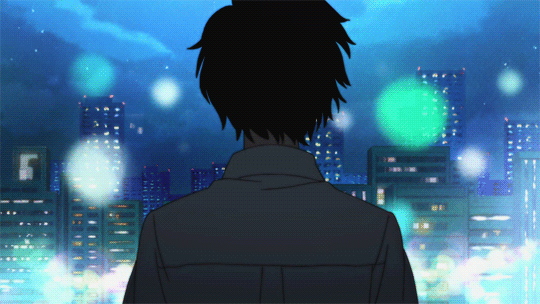
March remains director/auteur Akiyuki Shinbo’s most accessible work, and one of his masterpieces, as a well-paced and marvelously moody story of a depressed shogi prodigy learning to be a normal teenager before his youth completely passes him by, and the fantastic characters that surround him with their own complex problems and motivations. I just really, really hope it gets a third season eventually, because this one did not leave off on a satisfying conclusion.
Speaking of which...
Food Wars! Shokugeki no Soma S3 (9/10)

It’s almost a shame that My Hero Academia became hugely popular purely based on its accessibility to American audiences, because Food Wars pretty squarely deserves to be the reigning Shonen Jump king - each season has only improved on the previous one, and this one was based entirely on a continuing arc that could only have happened in the universe of this show, Fighting Food Fascism. That being said, it also leaves off right in the middle of the arc (because it had almost caught up to the manga), meaning that we have to hope that it can remain relevant long enough for there to be enough source material for another season. I’ll be crossing my fingers until they snap.
Banana Fish (9/10)
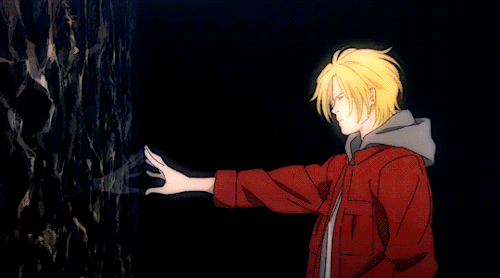
Yes, this has risen a point since my review, but Banana Fish still deserves to be thought of as both a complete masterwork of crime fiction, being fantastically paced and expertly plotted in the use of its many, many twists, and a work that disappointed the side of me that hoped that, in adapting it into the modern day, MAPPA could have managed to get the author to let them depict what is clearly a queer relationship with the authenticity and legitimacy that it deserved. It’s still amazing, though, and Amazon should be pushing it with their most lavishly-made originals. At least it was the last noitaminA show they’ll get to totally bury.
And, finally, the one you all saw coming.
BEST OF THE YEAR: Lupin the 3rd Part V (10/10)
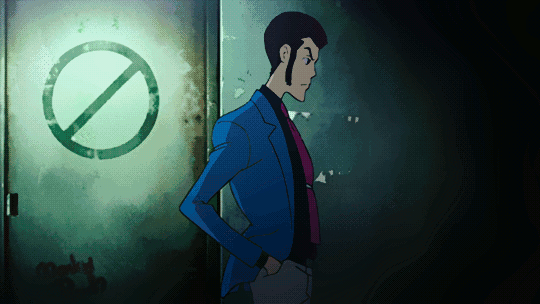
Lupin is, quite simply, one of the pinnacles of the medium. A simple idea that can (and did) go in thousands of different directions, handled by highly creative writers and an animation staff that has been knocking it out of the park for years, despite the fact that it is criminally (heh) unrecognized in the West. To put it simply, there’s a very, very good reason that it’s been around since the 70′s.
Okay! All I have left to do is finish Dragon Pilot (waiting on a friend) and we can get the last two lists out of the way! We’re almost done...
#multi 2018#arcaneanime#year end anime list#final thoughts#lupin the third#my hero academia#banana fish#food wars#the ancient magus bride#March Comes in Like a Lion#idolish7#major 2nd
72 notes
·
View notes
Text
The growing Hostility towards Redemption narratives in some circles.
http://jaredmithrandirolorin.blogspot.com/2018/02/the-growing-hostility-towards.html
I already hinted at how this bugs me briefly in my last post about The Last Jedi, called Subverting Expectations is not a substitute for actual Imagination. The "some circles" I mean right now are largely SJW ones, but not all SJWs. But it's ironic cause long ago, before I started these BlogSpot blogs, it was mainly a Conservative thing to complain about sympathetic villains in fiction. While people on The Left were arguing we need to reject such superficial classifications as good and evil. So the issue tends to be that redemption narratives are often a Privilege of Cis-Het White Males. And like my feelings on other subjects, the answer to this should be making more redemption stories for Queer and Non-White characters. Though those narratives can become problematic when it's primarily white people leading them to the right path. Or when redemption for a Queer villain requires rejecting their Queerness. Plenty of these people are not against any redemption narratives. But feel there are certain lines you can't come back from. My concern is that making people believe there is a certain line you can't come back from, will simply become a self fulfilling prophecy. Actions have consequences. A redemption story should not mean it's like that character's sins never existed, or that people have to trust them now. And just as recovering alcoholics need to stay away form alcohol, people who have a history of abusing their significant other should stay out of romantic relationships, especially with the specific people they abused in the past. Forgiving a lover who wronged you in the past does not mean you should then start a new relationship with them. This subject can kind of be divided into two categories. 1. Villains repenting of their sins and being forgiven by the narrative represented by the protagonist in the end before they die or something else ends their role in the narrative. Maybe while also doing some heroic redemptive act. 2. A Villain flat out becoming a Hero. I'm a supporter of both, the latter is a much more difficult thing to pull off well, which is exactly what makes the former often feel lazy. There are times when Sexism makes it seem easier for female villains to be redeemed, the High-Heel-Face Turn as TVTropes calls it. Plus the endless number of Femme Fatales who changed sides from falling in love with the Hero they were sent to seduce. The frustrating thing is when the now more virtuous version of the character loses the cunning she had before, like what happens to Ellen Palmure in the Rocambole novels. Also every Zelda Villianess has been pretty soft compared to the major male ones. On the subject of Star Wars. Some people feel in The Last Jedi specifically Kylo Ren passed the point of no return. And I can't call that wrong in the sense that I half way feel like that's what the film was saying. But logically I don't really buy it. Kylo (and the First Order as a whole) do not surpass the evilness of what they did in TFA, only in TFA were there attacks on civilians (if anything Rose and Finn's actions on Craite may have endangered civilians). TFO's actions are wrong in TLJ only in so much as they are on the wrong side of the War. Kylo certainly hasn't done worse then Vader in either film. Vader also killed his father-figure, and was much more directly involved when a super weapon was used to blow up an entire planet. And that's going off only Vader's OT Sins, just what audiences were expected to forgive him for in in 1983, not including what was added by the Prequels. And once again I have to talk about Anime. My love of Anime has a lot to do with how often enemies are forgiven. Because in Japan the West's simplistic Good vs Evil dichotomy has only recently become an influence. It's frequently been a big part of the Magical Girl genre. Sailor Moon didn't do it all the time, but Wedding Peach, and PreCure do it frequently, and so do the Darker Ones. So Rey setting out to try and save Kylo Ren because of the good she senses in him, and then that totally back firing on her. Feels to me like far more of a Meanspirited deconstructive slap in the face to Magical Girl convention then anything Madoka or it's imitators have done. And Rian Johnson could have been doing that intentionally, given how I saw a blatant homage to Magical Girl Lyrical Nanoha episode 6 right in that very confrontation. It's also a big thing in the Mecha Genre, where the message is often that War itself is the real villain. And my love of the Prequels has been that I felt it was saying something similar, that The Empire was created because The Republic fought a war it shouldn't have. When I started watching Mecha shows like Code Geass and Gundam 00, they reminded me of my love of the Prequels from day one. So the Sequel Trilogy doesn't just bug me that it's staying stuck in the simpler OT formula. It's the subtext that what happened between episodes VI and VII was that the First Order rose to power because the New Republic was too passive. As an Anti-War person, that is a very problematic message to me. I consider myself an SJW, (and also a Communist). Maybe you want to question my status as one simply because I don't agree with TheMarySue 100% of the time. But I've been banned from Christian Forums and Facebook groups for saying Homosexuality isn't a Sin, when I wasn't the one brought the topic up. The only stance I take on any major modern political issue that would be classified in modern America as a Conservative one, is not a Social Justice issue directly, it does come up on those websites, but I feel confident in saying it should not be part of the definition of what SJW means. For the most part when I get into disagreements with other SJWs, from my POV I'm to the left of them. I used to not be as much of an SJW as I am now. Much of that transition happened before I even started these blogs, but since starting them I've moved to the Left on Abortion and a few other things. It is not really relevant to mention that I'm a Universalist, this topic is about fictional narratives where characters change their moral enlightenment during their mortal life, and what real life lessens they teach. Some of the people I'm disagreeing with here may not believe in an after life at all. And probably would prefer Christians who reject Eternal Damnation. The Christian value that is relevant is that you should always forgive those who wrong you, even if they never apologize. And that you should love your enemies and pray for those who persecute you. For most of my life this seemed to be the most unambiguously Liberal of all Christian Values. It's the main area where Conservative Christians fail at being Christian, and the main area where Liberals might quote The Bible whether they're believers or not. It saddens me that this has changed about the Left over the same time period that I moved to the Left. But perhaps even that second Biblical subject may not be directly relevant. The question is, are there Biblical narratives of villains who become heroes? Well there is Saul aka Paul, who defined himself as the Chief of all Sinners. But perhaps a better parallel for saying that yes you can reach even Hitler level villainy and turn back, would be King Manasseh of Judah. He made the streets of Jerusalem flow red with Blood from one end to the other. But Second Chronicles records that he did repent and turn things around before the end. It's interesting that the compilers of II Kings chose to ignore that part of his story. But in the New Testament I think Matthew is siding with Chronicles here, since Manasseh isn't among the bad kings he skips in his genealogy in chapter 1.
#The Last Jedi#The Force Awakens#Star Wars#Star Wars Prequels#Kylo Ren#Reylo#nanoha#puella magi madoka magica#Mahou Shoujo#Mecha#Code Geass#GUNDAM#manasseh#King Manasseh#Magical Girls#Magical Girl Anime#Magical Girl Genre#Magical Girl Lyrical Nanoha
3 notes
·
View notes
Text
caseyj0nes I like Karneval a lot. The first scene is set up kinda sexually with a young boy, but it's not sexual? and there's a 14 year old girl who wants to be in a relationship with an 18 year old boy but the guys not into it. ?? idk i like it. it's pretty wholesome. Oh, and only 13 episodes.
I think I saw that one on crunchyroll, maybe I can check it out and see how I feel- the 14 year old might still creep me depending on how it’s handled (i mean the younger sibling with a crush on their older sibling thing is usually unreqiuted that doensn’t mean it’s not depicted in an effin creepy way)
klimpaloon-loves-superwholockyona yona of the dawn?? there's not really any canon queer representation, but you could make a good case for a couple of the main characters (and some side characters in the manga). The only other thing that it might hit on this list is incest since the main character initially has a crush on her cousin, but that's resolved by the end of the first episode. it only has one season of 24 episodes, but the manga has over 130 chapters
I think I’ve heard of that one maybe I’ll check it out? The cousin thing doesn’t bug me to the same extent as siblings or uncles or whatever for cultural reasons cuz apparently in japan it’s not quite as ick as we see it, to them it’s kinda like ‘pretty weird but not illegal’ and stuff like that tends to be resolved quicker (i did start watching this anime with lesbians and i’m not sure how i feel about the cousin thing there yet, cuz the one girl has a huge crush on her older cousin who’s marrying a dude and i can’t tell how creepy it’s gonna get)
neopuff OH gundam build fighters. i thought of one
Maybe, but i haven’t actually seen a lot of mecha anime or any gundam so idk how much i’ll get it
4 notes
·
View notes
Text
Why I get so up in arms over “those” fics
I discovered fandom when I was about 12 years old. I started with L.J. Smith’s Night World fandom, then eventually moved on to the Slayers anime and Gundam Wing. Fanfic helped me grow as a writer and come to terms with my budding queer sexuality. It helped me explore the world through different eyes. In short, fanfic is very important to me and will always hold a place in my heart.
Fandom was a very different place back then. Slash fiction was very taboo. No one posted it without adding a big disclaimer or hiding it behind multiple warning pages. It was a space for outsiders, some straight, some queer, but pretty much all thrilled to belong to a community.
I was an outsider in real life, too. I couldn’t seem to fit in anyway. I read too much, wore too much black, and pretty much didn’t know how to relate to people in my conservative southern town. My interests were all too nerdy, too morbid, or both. My teacher actually called my mother because she was concerned about the vampire books in my desk. People regularly asked me if I was a Satanist, and they meant it.
Fanfic became a space where anything was possible and nothing was forbidden. People wrote kinks just to say they did, and I read them just because I could, no matter how shocking or outrageous it was.
Lately I've been seeing a lot of posts about wanting certain kinds of fics off Tumblr, calling shippers “abuse supporters” and “pedophile apologists” (even if the character is 17-18). I’ve even seen people gossiping about what other people write: Oh my god, don’t listen to her, she wrote about [insert kink]. Yuck.
Writing or shipping something is not the same as supporting it in real life. I don’t approve of a lot of things that I write about, which include murder, cannibalism, and wearing crocs. (Thank you, Hannibal fandom.) (Just kidding, I would never write about crocs.) I write the stories that come to me, and sometimes they aren’t pretty. Sometimes I look at the plot and go, “Why did that have to happen? You could have had a happy ending. Everyone’s dead, you asshole.” But to quote Sherlock, “That just sort of...happened.”
There are stories out there that squick me out. There are stories out there that could trigger the fuck out of me if I read them.
But I want writers to be free to write whatever comes to mind, whether I approve of it or not. Because I’m used to people not approving of me. I’m used to seeing people like me hidden behind page after page of warnings.
I hate this culture of purity. My kink is acceptable; your kink is disgusting. My pairing is complex and challenging; yours is abusive. You wrote about people stealing candy from nuns. You must approve of religious intolerance and theft.
It reminds me of “Nice Gay” culture. Nice Gays are so wholesome! Monogamous relationships that lead to marriage, a white picket fence, and 2.5 adopted children. No radical politics, no bisexuals, no poly folks, no kinky shit, no hookups on Grindr. We're Nice Gays. We're just like you. Not like those filthy queers.
We're Nice Slash Fans. We only write wholesome, appropriate stories about things we would do in real life. Our characters have missionary sex twice a week with the lights off. Not like those bad fans over there who need to go back to the dark corners of the internet like it's 2003.
3K notes
·
View notes
Note
What queerbaiting? Yamagi is canonically CONFIRMED to be gay, Shino basically asked him out on a date (yes, that's exactly what it was, there's no other logical explanation, knowing the whole context and especially in the light of the Akihiro/Lafter drink invitation scene from ep. 41), thus confirming his VA's statements about Shino being bi/pan and making it into a two-way relationship instead of just a one-sided crush on Yamagi's side as some people would like to see it, and the only reason
cont. why the pairing didn’t happen is because it’s Gundam. A Gundam series killing off ships is nothing new, it was expected to happen, especially considering how brutal IBO in particular has been with its handling of romance, killing off pairings one by one in s2. Anyway, validating a gay ship is the exact opposite of queerbaiting. And Gundam 00 had plenty of LGBTA characters and whatnot; could literally write a whole essay on it, so I wouldn’t exactly call the franchise ‘the straightest’.
I was exaggerating calling it “the straightest” of course, I’d be interested to hear about canon Gundam 00 LGBT characters though! I headcanon Tieria as trans, but I’ve heard from some sources that it’s canon; I’d be ecstatic if it happened to be.
As for the whole queerbaiting thing: I know it’s not a new thing in Gundam. Actually, Gundam is much better about this stuff than other stuff like sports anime. I admit I’ve only really watched a few Gundam series, but IBO has seemed like the gayest one to me, which gives it a new special place in my heart (especially in light of episode 46). What I’m complaining about is things like when they killed Aston right as it seemed like there was a relationship developing between him and Takaki, when they did to same to Ein when there might have been something between him and Gaelio, etc etc. They do the same with the straight couples, of course, but usually there’s at least some indicator that they really did love each other romantically; if I may point to Lyle and Anew, Anew was killed fairly early in their relationship, but it was made clear that they both loved each other in a romantic way. None of the queer relationships, however, have been made explicitly clear before one side was killed off–Even with Yamagi and Shino, who were basically canon, Shino never explicitly asked him out romantically, even though it was heavily, almost directly, implied that Yamagi liked Shino romantically. It could just be me nitpicking, but it does tick me off a bit.
Thank you for your input, though! And I’d love to hear which characters from 00 are confirmed LGBT beyond speculation (especially Tieria).
#gundam 00#gundam ibo#gundam iron blooded orphans#gundam tekketsu no orphans#either way i love both ibo and 00#i never thought anything could tie with 00 for my favorite gundam series but here we are
4 notes
·
View notes
Text
A brief treatise on the benefits of going full fandom
I’ve been helping a friend who’s watched Voltron and fallen headlong into fandom love, and like me hadn’t been in such a position since adolescence, and thus I’ve unearthed this saved draft post because I’m having some feelings. They’ll be jumbled AF but bear with me.
I want to talk about what it is to be 28 years old and in a fandom again, after about 14 years away. I might be one of the older people in the fandom--certainly I was in the Victuuri Discord server--but I don’t care. Because I’m home.
By far my happiest memories of childhood/adolescence are those from grades 7-9 (which is called junior high where I grew up, similar to middle school). Those were the years when I was the most heavily involved in anime and other fandoms. That was the period where I read fanfiction.net for hours, and wrote dozens and dozens of Gundam Wing and Escaflowne story prompts which still live on my hard drive to this day. I stayed up late into the night writing, and carried a separate notebook to school which I always filled with stories. I drove my family nuts with my obsessions, but those first fandoms were stunningly wonderful memories. The characters became friends, and in my mind’s eye they watched over me as I navigated the world. I loved those shows so much it was intoxicating; it was a joy that felt so overwhelming that it was easy to overdo it and go from soaringly happy to sobbing on the floor.
I felt so much, so strongly, and it was wonderful. It got me through a difficult family life and traumatic years of bullying and the lonely, confusing world that is being a younger teenager.
I grew up, went to high school, had my first real relationship and heartbreak. Went to university in another city, and learned things I’d never thought I’d learn. When I was 23 I developed clinical depression; I lost the ability to watch movies, to feel, to be intoxicatingly in love with anything. And one day I realized with horror that I had lost that sense of passion which had made me so emotional throughout my youth--the spark that drove me to write fiction, because I’ve pretty much only ever written fan fiction. Three years later, after a lot of work and recovery, Supernatural brought back a little bit of that feeling, but it just wasn’t the same.
I was really, really sure that the intense passion was gone. And that made me sadder than I thought possible.
I’m now in graduate school. In December, I finished one of the worst semesters of my life, where I was stressed and depressed and anxious for three months straight. Four days after I handed in my final assignment, I found I had the energy to watch something new; Yuri on Ice is what I picked. And it lit my whole brain on fire.
I’m writing fanfic again. I’ve published three one-shots and am working on a longer piece that people are reading and that I love writing. I spend every day planning out little bits of the story, interacting with my world with an eye to what could be adapted into a scene. Yuri and Victor follow me like joyful ghosts.
I wrote professionally for three years, but words fail when I try to describe how important this fandom is to me. Because it isn’t just the beautiful animation or the the gorgeous music or the queer relationship or the accurate depiction of an anxiety disorder. It’s because I regained something I thought I’d lost forever.
I know myself a little better now. I know that my mood will ebb and flow, that I’ll have periods of happiness interspersed with times when I can barely look at myself in the mirror. And I know that the intensity of a fandom always carries with it the possibility that the flame will one day fade; but until that day comes, it’s been beyond wonderful to be part of this world and this community.
Being an adult often means being ironic, sardonic, cynical, and anxious. Yuri on Ice makes me feel beyond happy. It saved my sanity and it awakened a part of myself that I’d feared was gone forever.
So yeah. It’s a pretty amazing show.
2 notes
·
View notes